












In June of this year, Worcester celebrated its tercentennial with a jubilant parade that featured dozens of groups representing the city today—from the Caribbean, Central and South America, to Africa, Asia, and Europe.
Ours is truly a global community! The Worcester Art Museum embraces this cultural richness by collecting and exhibiting art that represents thousands of years of human creativity from around the world, and thereby deepening our connections with audiences both near and far.
One way we are achieving this is through strategic additions to our curatorial team, which in turn expands our vision for programming and collecting. Samantha Cataldo, our new Associate Curator of Contemporary Art, joined the Museum in May and has wasted no time in reinvigorating our presentation of global contemporary art. In June, she traveled to Europe to attend important international art fairs that will help her grow our collection of contemporary art and develop new exhibitions and programs to enhance the visibility of underrepresented communities of artists at WAM. This includes strengthening our connections to the local and regional art scenes. Read her article about the art fairs and how they will inform her work on page 14.
In August, Natalia Ángeles Vieyra became our new Associate Curator of American Art, filling a vital role of infusing greater diversity into our collection of American art. She brings to WAM broad multicultural expertise and a transnational approach to her work, which will inspire a fresh perspective on our collection. Her eagerness to draw connections between historical collections and issues of contemporary interest will add to conversations about how to incorporate diverse experiences into our presentations of American art.
The Worcester Art Museum’s evolution continues with exciting progress on several building projects. This summer the Museum received two game-changing anonymous grants, totaling $16 million, that make us well-positioned to build the arms and armor gallery of our dreams and safeguard our growing collection for generations to come. With the Lancaster Plaza entrance finished and providing vital accessibility to our visitors, our focus turned last spring to replacing the original windows in the Higgins Education Wing (HEW) with new, energy-efficient units. This upgrade will make WAM greener and more environmentally sustainable at a time when energy is very much on our minds. As I write this, construction of the new library in the HEW is nearly complete and staff are preparing to begin the complicated process of moving the entire Museum Library collection to its new location. Read more about how we are transforming the Library for the 21st century on page 12.
If you have not yet seen our special exhibition, Jewels of the Nile: Ancient Egyptian Treasures from the Worcester Art Museum, please plan to before it closes in January. This stunning presentation (see article on page 6) is the latest in our efforts to bring important works out of storage for the public to enjoy. Other recent examples, both funded by the Henry Luce Foundation, include the 2018 restoration and exhibition of stained glass windows by John La Farge and Louis Comfort Tiffany and the conservation of Edward Augustus Brackett’s sculpture, Shipwrecked Mother and Child, completed in 2022.
We are grateful to you—our generous Members, Trustees, donors, funders, and volunteers—for your dedication and support as we work to fulfill our mission with these exciting initiatives. I hope you will enjoy this latest issue of access and that you will be able to attend the many programs and exhibitions we have planned for the coming months. As always, we are grateful to hear about your experiences with WAM. Feel free to reach out by email to marketing@worcesterart.org.
Dorothy Chen-Courtin, President James C. Donnelly, Jr., Vice President Douglas S. Brown, Vice President Sarah G. Berry, Treasurer Susan M. Bassick, Clerk
Lawrence H. Curtis Jennifer Davis Carey Michael B. Fox Mark W. Fuller Jennifer C. Glowik-Adams Karen M. Keane
Sohail Masood
Margaret McEvoy-Ball Thomas P. McGregor Philip R. Morgan
Malcolm A. Rogers
Jonathan R. Sigel
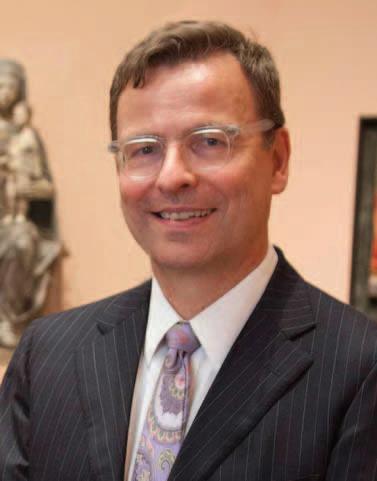

Anne-Marie Soullière Cynthia L. Strauss George W. Tetler III Christina Villena
Ex Officio Matthias Waschek Jean and Myles McDonough Director
Right: Visitors discuss a work by artist Byron Kim in the recent exhibition, Us Them We | Race Ethnicity Identity.

The words “ancient Egypt” can evoke larger-than-life images— towering pyramids and palaces, vast desert landscapes, the great Nile River, legendary pharaohs. Yet some of the most prized and sacred artifacts from that early civilization would fit in the palm of your hand—tiny ornaments designed to adorn and magically protect the body, in life and after death.
Some of the finest surviving examples of Egyptian jewelry, ranging from elaborate necklaces to individual beads, are show cased in the exhibition Jewels of the Nile: Ancient Egyptian Treasures from the Worcester Art Museum. With over 300 objects, Jewels of the Nile is considered a large exhibition. Yet most of the pieces are no bigger than a few inches, and many are much smaller. Creating a compelling and engaging exhibition around so many tiny objects proved to be an unusual challenge. However, the Jewels of the Nile designers, Yugon Kim, Tomomi Itakura, and Karen Kuo of IKD Design, were up to the task.
“We knew right away that we were going to have to get a sense of the big picture— how the objects needed to be organized and what narrative was being told through these objects,” said Itakura. “We wanted this show to be special and unique. There have been countless Egyptian exhibitions, and we have designed other Egyptian exhibitions in the past. The big questions for us were: in what way is this particular show—at this particular time at WAM— important, and how is this one different from any other Egyptian exhibition?”
They focused on the story of Bostonians Kingsmill Marrs and Laura Norcross Marrs and their friendship with archaeol ogist Howard Carter, who discovered King Tutankhamun’s tomb on November 4, 1922. That friendship, cultivated over many years in the early 1900s through correspondence and travels to Egypt, resulted in one of the most extensive collections of ancient Egyptian jewelry in the United States. The collection devel oped within the careful parameters put in place by the Egyptian government. Only
artifacts that duplicated what was already in the national collections left the country. Upon her death in 1926, Mrs. Marrs donated to WAM the collection she and her husband assembled with Carter’s expert advice.
The IKD team worked with the exhibition guest curators, Peter Lacovara and Yvonne J. Markowitz, to anchor the displays of colorful jewelry and other objects in the Marrs/Carter story. Photo graphs of Egyptian landmarks taken in the early 20th-century, when the Marrses spent time in Egypt, were enlarged to fit gallery walls, creating exciting, life-size backdrops. Thus, visitors can explore the ancient artifacts under the gaze of the Great Sphinx, or alongside the mortuary Temple of Ramses III in Western Thebes—almost under the shade of palm trees. A vintage postcard with a photo graph of the grand Winter Palace, where the Marrses stayed when they visited Luxor, fully occupies another wall. Else where, oversized papyrus and relief paintings with hieroglyphics and scenes of

ancient daily life convey what it might have looked like inside a temple or tomb.
“We felt the space needed these strong immersive visual moments to contrast with the scale of the objects,” explained Kim. “The images also show how the jewelry was made and worn, offering another layer to the experience. And, since most of the display cases require looking down to view the objects, the backdrops provide visual interest at eye level and above.”
Creating a meaningful experience for visi tors was more than designing impactful visuals and displays, according to Itakura. “Many visitors coming to see Jewels of the Nile might have preconceived notions or assumptions about Egyptian culture and history. We hope that by experiencing the exhibition, they will come away with some new knowledge or realization, along with curiosity and a desire to learn more.”
For Kuo and her IKD colleagues, it has been deeply satisfying to be part of WAM’s effort to celebrate the contributions of ancient Egyptians and excite new audi


ences about a cultural legacy that has endured for thousands of years. “When Mrs. Marrs gifted this collection to WAM, she wrote that her Egyptian jewelry would make a ‘wonderful display.’ And now, the collection is finally being shown together in its entirety for the first time,” Kuo said. “We hope Mrs. Marrs is pleased!”
This exhibition is made possible through the generous support from Dr. Sohail Masood, his wife Mona Masood, and their children Laila Masood and Omar Masood.
Additional generous funding is provided by the Rita J. and Stanley H. Kaplan Family Foundation, Inc., Fletcher Foundation, and Sandy Hubbard and Thomas J. Logan. Interactive elements in the exhibition are supported in part by the Mass Cultural Council's Innovation Fund. Related programming is supported by the Schwartz Charitable Foundation.
Sponsored by:
Media Partners:
Additional support from:
In 1901, just three years after the Worcester Art Museum opened, it received an unprecedented bequest: 3,700 Japanese woodblock prints from John Chandler Bancroft (1835–1901). This trove, amassed by the Boston businessman over several decades, was the earliest American collection of its kind and is still considered one of the finest in the nation. With his keen eye and pioneering collecting practices, Bancroft not only elevated the Museum’s art holdings substantially, but also paved the way for other Japanese print collectors in the United States. This fall, for the first time, the Museum will present an exhibition that celebrates his extraordinary legacy.
Most of the prints in the John Chandler Bancroft Collection at WAM are ukiyo-e, which translates literally to “pictures of the floating world” and often reflect the indulgent or artistic activities in Japan's urban centers. Drawing upon classical art and literature, as well as evolving trends in popular design at the time, ukiyo-e emerged during the Edo period (1603–1868) and encompassed a variety of subjects. These ranged from the traditional, including lush, picturesque landscapes and Buddhist iconography, to the modern
and cosmopolitan, including elegantly attired courtesans or kabuki actors and scenes of daily life. The Floating World: Japanese Prints from the Bancroft Collection, opening on November 26, will show nearly 50 of these woodblock prints—among the most prized that Bancroft purchased and most of which have never before been on display.

John Chandler Bancroft’s passion for art as both an artist and collector began after he moved to Europe in the mid-19th century after withdrawing from Harvard Law School. He spent six years in Dresden, Dusseldorf, and Paris, studying drawing and landscape painting, and eventually returned to the United States with the outbreak of the Civil War. Settling near Newport, Rhode Island, Bancroft then frequented the studio of painter William Morris Hunt (1824–1879) and became acquainted with young artist John La Farge (1835–1910).
Bancroft and La Farge quickly forged a friendship that would last a lifetime, fueled by their shared interest in art criticism and appreciation, as well as their fascination with what was at the time
modern color theory (based on new discoveries in the fields of optics and optometry). They also developed their respective art practices together, often spending time painting landscapes en plein air and discussing the contemporary art movements, such as modernism and impressionism. Both began to purchase and collect Japanese ukiyo-e prints beginning in the early 1860s, several decades before the wave of “Japanomania” consumed the country. This was also over twenty years before most other eminent American collectors, such as William Sturgis Bigelow (who donated his collection to the Museum of Fine Arts, Boston), began assembling Japanese print collections of comparable size and scope.
Although there was very little English scholarship on Japanese art during his time, Bancroft was still able to assemble a collection that impressively reflected the diversity of ukiyo-e prints, which vary in size, date, material, function, content, and style. His collection was also notable for the quality and well-preserved condition of the prints, possibly due to the fact that he acquired them directly from Japan or a dealer, not long after they entered the market.

Even while Bancroft was alive, his contributions to American arts, collecting, and Japanese print scholarship did not receive the recognition they deserved. John La Farge referenced this when writing the obituary for his dear friend. “Of him I have seen no sufficient notice taken … Mr. Bancroft's career… is a type of the many intellectual efforts which influence and help and determine the general movement, while the individuals whose minds have acted in this way are little known by name to the general public which still feels their intentions and their studies.”

Now, 121 years after John Chandler Bancroft’s landmark bequest to the Worcester Art Museum, the special exhibition, The Floating World, will spotlight his remarkable collection—as a Worcester treasure and as an international resource for research, education, and inspiration.
Research for this exhibition was made possible through the generous support of Philip and Ellen Phillips.
—Rachel Parikh, Ph.D., former Associate Curator of the Arts of Asia and the Islamic World, and Fiona Collins, Curatorial Assistant of Asian Art
Every year the Worcester Art Museum adds to its permanent collection, either by purchasing works from dealers or individuals or by receiving gifts and bequests from art collectors. In each scenario, curators and conservators follow a thorough process to determine the suitability of the work for WAM. (For example, does it fill a gap in the collection or increase the presence of underrepresented artists or groups?) An important part of the process is ascertaining the work’s physical condition, including if it will require conservation treatment upon entering the collection and if the Museum has the appropriate storage conditions to preserve the work for future generations.
Many of the Museum’s new acquisitions are works on paper, which are often vulnerable to environmental conditions. To learn more about what happens when assessing a potential new print, drawing, or photograph for the collection, we asked Paper Conservator Eliza Spaulding to walk us through the process she follows.

access: Your work is important in preserving the Museum’s collection of works on paper. Tell us what your role is in the acquisitions process.
ES: As the paper conservator, my role is four-part: to study the materials and techniques of how a work on paper (print, drawing, or photograph) was made, to assess its condition, and to determine how we would conserve, if necessary, and preserve the work if it became a part of our collection. My Conservation Department colleagues in paintings, objects, and arms and armor have similar roles in assessing artworks of their respective media.
access: How do you approach your assessment of a potential acquisition?
ES: The Museum’s curators and Director consider acquisitions from a range of sources including: galleries, art fairs, and private collections around the world. When
possible, I prefer to examine a potential acquisition unframed and in person at WAM. Here, I have access to a range of tools that allow me to understand an artwork as fully as possible. I use a variety of different light sources, such as raking light, which casts light at a 45-degree angle across an artwork’s surface to see texture, and transmitted light, which shines light through an artwork to see density. I also examine an artwork’s surface through a stereomicroscope to see its material composition up close and detect condition issues. Sometimes, it is necessary to examine an artwork by visiting it wherever it is located, or through photographs.
In addition to the physical examination, curators, conservators, and registrars collaborate to gather as much information as possible about the artist, the history of the artwork—including past conservation treatments—and to consider if, how, and where we would be able to safely store the artwork at the Museum. Acquiring an artwork by a living artist is a special opportunity to learn directly from the artist about their materials, techniques, and how they envision their artwork changing over time.
access: What are the challenges you have encountered when assessing acquisitions?
ES: Many of the challenges are related to understanding how an artist created their work. For example, when I first examined a proposed acquisition by Ernst Heeger
(Austrian, 1783–1866), I thought the artworks were drawings. Upon further examination and talking with the dealer, I learned they are, in fact, salt prints hand colored with watercolor. Both a scientist and an artist, Heeger combined his interests and took pictures of specimens through a stereomicroscope, capturing the images on sensitized glass negatives. He processed the glass negatives as salt prints, and then delicately hand colored them, using watercolor to achieve these exquisitely delicate specimen depictions.

access: Are there any acquisitions you have particularly enjoyed working with?
ES: In the past several years, WAM has acquired so many wonderful works on paper that have broadened our collection in important and interesting ways. These include increasing the number of underrepresented artists and introducing artworks that explore innovative techniques in thoughtful and dazzling ways.
I enjoyed working on Louisiana P. Bendolph’s American Housetop for the Arnetts and Mary Lee Bendolph’s To Honor Mr. Dial, both from 2005. In the Bendolphs’ large and stunning prints, the artists pressed small scale quilts onto wax-coated plates (a softground technique)—capturing the delicate physicality of the quilts—to which etching and aquatint were added.
Top: Ernst Heeger, Trichoteryx excavata. Imago. Oligella foveolata. (Adult stage of hollow featherwing beetle), detail, 1860, salt print handcolored with watercolor, Gift of Hans P. Kraus, Jr., 2022.11
Opposite page: Mary Lee Bendolph, To Honor Mr. Dial, 2005, softground etching, aquatint and spitbite on paper.
© 2022 Mary Lee Bendolph / Artists Rights Society (ARS), New York. Museum purchase through the estate of Blake Robinson, 2021.4


For over a century, as times have changed, so has the Worcester Art Museum’s Library. As the largest art history resource in central Massachusetts, it has undergone numerous renovations over the decades. Its collections have grown and evolved to meet changing needs, and a variety of programs, projects, and initiatives have been implemented. Now, the Library is adapting yet again, undergoing a major transformation to meet 21st-century research needs and expectations. In January 2023, a new, modern library will open in the Higgins Education Wing, where it will provide greater accessibility for the entire community. There is a great deal to be excited about as we embrace fresh approaches to providing art research materials and enriching programs for Worcester and beyond.
Visible from Salisbury Hall, the former Library—with its traditional shelves and classic reading room—has long been a familiar landmark for visitors. Perhaps not so obvious, however, is how the Library has kept pace with a changing research landscape over the decades. Innovations in technology have doubled the size and scope of the collections, while expanded access to physical resources through digital means has connected scholars quickly with information around the world. At the same time, the Worcester Art Museum, like so many institutions, has been working hard to build an inclusive and welcoming culture for all.
In planning a new Library that reflects values of accessibility and is designed for maximum adaptability, Head Librarian Rebecca Morin and her WAM colleagues left no stone unturned. This included extensive research on how other libraries have successfully adopted innovative approaches to their collections and how their spaces function. With a library on its campus, the Museum has a rare and exciting opportunity to think creatively about how it serves its constituents. This will include bringing library materials into galleries and studio spaces, plus integrating librarian-created programming throughout the building and into the community.
To shape this new vision for the Library, Morin has developed the following guiding principles:
Community: Throughout the Library’s history, our commitment to serving the public as a free and open resource has been unwavering. With the Library now in a location with greater public accessibility, we can build on this commitment. That will include pursuing new connections within our community; creating opportunities for general curiosity and discovery by happenstance; and encouraging all users to share their knowledge, stories, and creative pursuits in novel ways.
Creativity: We are committed to a forward-thinking approach in planning and using the Library space—one that does not hinder the potential for growth and creativity, but rather is adaptable to the Museum’s changing day-to-day needs and the needs of future Library users and staff. We will no longer think of the Library as a single, enclosed, and purely physical space. It can exist wherever and whenever there is a WAM librarian present to share resources and programs.
Collections: We take seriously our responsibility as the largest art research library in central Massachusetts. The WAM Library collection mirrors the strengths of the Museum’s object collection, while also supporting exhibitions, programs, conservation, and museum theory. The new Library will provide the best care for its collections of books and periodicals, and allow us to explore innovations to best meet the needs of researchers near and far.
Connections: Museums and libraries are learning communities, built on meaningful connections between knowledge creation and sharing. The new Library will harness the power of connections and storytelling to engage our audiences, build new partnerships, and further support the mission of the Museum.
You can learn more about this exciting Library transformation project, as well as take advantage of our myriad online resources, on the WAM website (worcesterart.org/collection/library). We look forward to welcoming you to the new Museum Library when it opens in January.

Long before I traveled to London or Giverny, I traveled at WAM. As a teenaged student, crossing Salisbury Street from North High School, I headed upstairs to a favorite corner where I experienced the fog, haze, and delicious mystery of Monet’s Waterloo Bridge.
Earlier, I had lived in Washington, D.C. and spent many hours in the National Gallery with my parents and siblings. I knew a little about Monet and the great bright haystacks, poplars, and water lilies, but the deep mystery of this 1903 London painting was fascinating and new to my high school eyes. I loved it, and I loved that it lived at WAM, so close to home.
Over the past six decades, this picture has held its allure for me. It was a special thrill a few years ago when WAM presented nine of the Waterloo Bridge paintings. We could see WAM’s example in its place among the great works in Monet's series.
Apart from Monet, London’s Waterloo Bridge also inspired one of the great noir film classics, the 1940 movie of the same name. Starring the unforgettable Vivien Leigh and Robert Taylor, the film tells a tragic story of wartime romance and sorrow, with important scenes taking place on the bridge. Both actors said those roles were their career favorites. A recent viewing at home showed me why: they were brilliant performances shrouded in the same aura as the bridge itself. It was yet another instance of great art inspiring powerful imagination and creativity beyond its own frame. Thank you, Worcester Art Museum.
Anne-Marie Soullière, of Chestnut Hill, is retired President of the Fidelity Foundations and a member of the Worcester Art Museum Board of Trustees and Salisbury Giving Society.
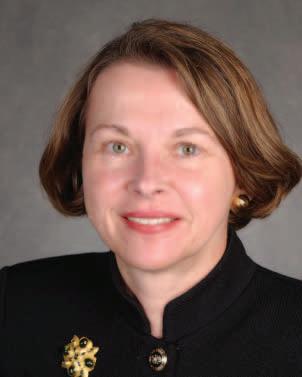
The one work that transports me to a very personal place is Terri Priest’s Static Variations: Blue x 2, a huge diptych from her Op Art period that vibrates with pulsing fields.
Created in the early 1970s, a few years before we met, this work epitomizes Terri. To confront it is to visit a cherished friend, who died years ago.
Terri was a woman of passions: an iconoclast (literally), political activist in civil rights, entrepreneur, mother of two sons, and, supremely, artist. She had innumerable friends. Why she drew me into her orbit was a mystery—and one of the great privileges of my life.
We’d see each other at local events and did some traveling together. She opened doors everywhere, but our friendship really developed when at her house. We’d talk for hours, enjoy Lebanese treats, and listen to music.
When I asked what she was working on, she’d lead me downstairs to her studio to show me her latest efforts, discuss the challenges she faced, and reveal her artistry. When she asked my opinion or advice, she listened attentively.
Years later, standing before Static Variations, I hear Terri point out how many coats of gesso it took to achieve the perfectly smooth surface of the converging blue arrows; the exacting effort it took to create the laser-straight stripes with their razor-sharp edges; how after 50 years the birchwood stretchers haven’t warped a micron, the canvas still perfectly taut.

Yes, she’s boasting about all these things, but then laughs to hear herself brag and draws serious as she explains the political and racial equality symbolism of the work.
These are the thoughts and memories that wash over me as I stand before Static Variations: Blue x 2.
Bernard Whitmore of Worcester is a longtime WAM Member, Corporator, Salisbury Giving Society Member, and volunteer. He is retired from Saint-Gobain.

Curators of contemporary art have the unique privilege of working with artists to develop and exhibit their work, bringing their creative vision to the public, and helping incorporate the visual arts into the broader culture. What is most exciting to me about working with living artists and curating the art of our time is that everything is in constant flux. Established ideas are being challenged just as frequently as new ideas are brought forth. As my colleagues and I work to reinvigorate the presentation of contemporary art at WAM, we are keenly aware that Worcester and the world around it is changing at a rapid pace. This should be reflected in the art WAM presents. As a recent Worcester transplant, I am researching and experiencing what arts and culture in Worcester has been, is, and can be. A crucial part of my job is to help connect WAM with national and global arts culture.
One of the key ways that artists, curators, and others in our field connect on these important topics is through international art fairs and events. Due to pandemic rescheduling, two such events fortuitously overlapped in the summer of 2022: La Biennale di Venezia (Venice, Italy) and documenta (Kassel, Germany). This presented the perfect opportunity to conduct research by visiting these very different but equally influential events.
Known as the “Olympics of the art world,” the Biennale began in 1895 and is considered the preeminent international art event. Numerous artists in WAM’s collection have been award-winners at this sprawling and prestigious event, including Christian Marclay (2011), Bruce Nauman (2009), Louise Bourgeois (1999), Nam June Paik (1993), and Henri Matisse (1950). Taking place every five years, documenta began in 1955 as Germany sought to reconnect with the international art world following World War II. It has since become known as highly experimental and influential, a harbinger of artworld trends, and a place for critical discourse. Art is installed throughout the city, from museums to underground tunnels to 18th-century palaces.
This iteration of the Biennale was organized by New York-based curator Cecilia Alemani around a surrealist theme that posits “a magical world where life is constantly re-envisioned through the prism of the imagination. … a world where everyone can change, be transformed, become something or someone else.”1 The rigorously researched exhibition included historical material alongside contemporary work that centered the imaginations of BIPOC (Black, Indigenous and People of Color), women, nonbinary people, and other marginalized groups. This year’s documenta was curated by an Indonesian artist collective, ruangrupa, who fittingly organized the exhibition based on the principles of collectivity, communal building, and sharing of resources.2 The participating artists came from highly diverse backgrounds, and the work presented was wide-ranging and took non-traditional forms, manifesting most often in community-centered or collaborationdriven makerspaces and gathering places.
The common thread that was most relevant to the work we are committed to at WAM was the emphasis on celebrating diverse viewpoints and centering community. There was an ethos that art is not just to be looked at, but experienced, becoming an integral part of one's life. This is front of mind as we plan future presentations of the art of our time alongside WAM’s superb historic collections. We must consider how contemporary art and artists can speak to issues that are most relevant to the many communities that we serve. At the same time, we want to present art that inspires conversation, encourages respite, and increases joy. I look forward to working with WAM’s various stakeholders to bring these experiences to fruition and further WAM’s mission to connect people, communities, and cultures through the experience of art.
Samantha Cataldo joined WAM as Associate Curator of Contemporary Art in May 2022, bringing to the Museum her specialized expertise in contemporary art and commitment to community engagement, accessibility, and diversity. Cataldo graduated from Providence College with a degree in Art History and from Case Western Reserve University with a master’s degree in Art History and Museum Studies. Prior to coming to WAM, she was the Koch Curatorial Fellow for deCordova Sculpture Park and Museum and Senior Curator of Contemporary Art at the Currier Museum of Art.
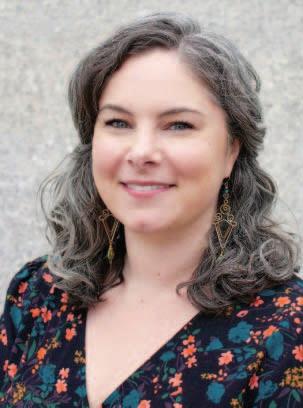
1 Biennale Arte 2022 | Biennale Arte 2022: The Milk of Dreams (labiennale.org)
2 documenta fifteen (documenta-fifteen.de)
Gallery tours and lectures are some of the most visible and valued manifestations of our many partnerships with local colleges and universities. Yet, these synergistic relation ships go even deeper. Behind-the-scenes collaborations range from co-curating exhibitions and developing art history content to conserving the collection and maintaining the Museum Library. The results are richer experiences for WAM visitors, access to new scholarship and technology for staff, and exceptional learning and professional development opportunities for students and scholars.
“This is the quintessential ‘win-win’ situation,” says Matthias Waschek, the Museum’s Jean and Myles McDonough Director.
“The cross-pollination of ideas and perspectives between WAM and our educational partners is synergy at its best, contributing immea surably to our collective knowledge and understanding of art. Without this, the Museum would not be able to achieve its mission.”
Volumes could be written about the numerous partnerships between the Worcester Art Museum and educational organizations over the past 125 years. Generations of scholars, students, and Museum staff have been inspired by WAM’s collection in myriad ways and what it can teach us about the human condition and creative expression. Here is just a snapshot of the diversity of these collaborations and their transformational impact.
Inviting professors and their students to contribute ideas and perspectives to shape a museum exhibition is both unusual and bold. Yet, over the years, WAM has worked with faculty and students at Clark University on numerous such projects. A recent example is Us Them We | Race Ethnicity Identity, an expansive exploration of diverse perspectives on identity that included an adjunct display of 12 student artworks. Created during a Clark University course taught by the exhibition co-curators*, the student works responded personally to objects in Us Them We—and expanded both their understanding and expression of identity.
“The course pushed my boundaries in the work that I created. I’ve always been a portrait photographer, but this course helped me experiment and push the limits to what I thought I could make,” says Sam Damon, who participated as a Clark senior.
The Museum Library is one of the most visible—and often invis ible—educational partnerships at WAM. Founded in 1909 for the study and enjoyment of art history, the Library has been managed in collaboration with the College of the Holy Cross since 2001. This unique relationship allows the College to host the Library’s art history catalog of over 63,000 titles. It also provides many additional services, including access to over 50 worldwide digital research resources for anyone who needs them. Most of the 2,500 visitors and hundreds of researchers who request informa tion from the Library each year may be unaware that this important art historical resource is available thanks to a longstanding collaboration with Holy Cross. (Read more about the Museum Library and how it is being transformed for the 21st century on page 12.)
In early 2020, when Objects Conservator Paula Artal-Isbrand needed to reconstruct missing fingers and toes on Edward Augustus Brackett’s life-size sculpture, Shipwrecked Mother and Child, she only had to go a block up Salisbury Street for help. Faculty and students in Worcester Polytechnic Institute’s (WPI) Laser Holography and Advanced Prototyping Labs worked with Artal-Isbrand to create new digits for the 19th-century marble sculpture using advanced 3D printing technology. The results were so realistic that Brackett himself would likely not notice that parts had been replaced. Through this real life, real art application, the WPI team also expanded their expertise, which will serve both current and future projects at WAM.
A different kind of collaboration focused on the age-old relation ship between art and literature. Beyond the Frame: Celebrating a Partnership in Public Education and the Arts, published in May 2022, may be the first such project for WAM. Worcester State University (WSU), a longtime educational partner, invited eight New England writers and four WSU faculty members to reflect, in essays, on WAM artworks that inspire them. The eloquent volume honors an invigorating partnership and shared commit ment to an education informed by the arts—and opens new windows into WAM’s collection through diverse voices.
Although representing just the tip of the iceberg for WAM’s many educational partnerships, these examples do reveal how impor tant local colleges and universities are to the Museum fulfilling its mission—and how vital WAM is to these partners in providing a creative laboratory for experimentation and exploration.
* Exhibition co-curators: Nancy Kathryn Burns, Stoddard Associate Curator of Prints, Drawings and Photographs at WAM, and Toby Sisson, Associate Professor and Program Director of Studio Art at Clark University

Through November 6, 2022
Artist Nancy Diessner, a printmaker based in Florence, MA, explores the intersection of sculpture, photography, painting, and drawing in her current work. Her imagery is created through various alternative photographic and printmaking processes that use UV light to expose film to plates that she then prints like traditional etchings. She draws inspiration from rowing and the river environment. Moving her long, thin boat over the surface of water, Diessner has stated, “…my boat becomes an extension of my studio.” In her recent work she has used paper made from invasive plant species to shape the forms of her boat-like objects. In these pieces, figures and animals—often engaged with water—rest and float within the cocoon of the boat forms. Diessner works in low-toxicity printmaking processes and teaches workshops at Zea Mays Printmaking in Northampton. Supported by the Don and Mary Melville Contemporary Art Fund.
November 9, 2022 – May 7, 2023
Our expectations of how a photograph or video should look is challenged in this new CMAI installation of works from Brittany Severance’s ongoing photographic series Blind/Blend and her film, Illuminated. The Worcester-based multimedia artist explores the relationship between vision and understanding, manipulating the camera to capture the world as she sees it. An assistant professor at Worcester State University, Severance has a degenerative vision impairment that informs and shapes her creative practice. The artist simulates her uncorrected severe near-sightedness by photographing her daily life using a soft focus and a shallow depth of field. She says she invites viewers “to consider alternative ways of seeing the world…and to build an understanding and connection between full sighted individuals (including those who may use corrective lenses) and people who have low vision.” In her work, Severance asks: is identifying an image’s source material important or “can we accept it as something unique and beautiful on its own?”

Supported by the Don and Mary Melville Contemporary Art Fund.
For nearly 1,000 years, Japan was ruled by samurai, members of the nation’s warrior class. During that time, these great warriors maintained a delicate balance between, and paradoxical relationship with, the arts of war and culture (bu and bun). This balance of military prowess and beauty—as well as the evolving position of samurai arms and armor in Japanese society, culture, and craftsmanship—is exquisitely demonstrated in the current Japanese Gallery case installation.
The installation includes a selection of samurai helmets, swords, armor components, and firearms that show the extraordinary breadth and versatility of the armorer’s skill. These are objects that withstood the rigors of warfare, but also spoke to the importance of art to the samurai. This is especially evident in the assortment of decorative sword guards, or tsubas, on display. Embellished with images from nature, mythical scenes, or poetry, these tiny metal canvases perfectly illustrate the samurai’s dual roles as warrior and stateman. The armor makers kept busy even during peace time, turning their attention to less militaristic activities, including creating amazing jizai figures. The Art of the Samurai includes two tour de force examples of these realisticallyshaped animals: a spiny lobster and a dragon. Made from numerous hammered iron plates, the articulated figures move like real animals— and epitomize the Japanese metalworker’s genius and artistry.
Top: Attributed to Myō
1850–1900,
Munekazu (Japanese), Articulated
Figurine of a Dragon

Bottom: Nanban School (Japanese,

The Worcester Art Museum’s Spotlight Series features in-depth presentations by art scholars, providing insights and stories about works in the Museum’s collection or on view in special exhibitions. The art talks are held on most third Sundays at 2pm.
For information about upcoming Spotlight Series talks, please visit worcesterart.org/events/talks.
Hosted by the WAM Members’ Council, the Spotlight Series is presented with support from the Bernard G. and Louise B. Palitz Fund and the Amelia and Robert H. Haley Memorial Lecture Fund.
Sponsored by:
Every exhibition and program at WAM is only possible through the generosity of people who care about the Museum and the topic being presented.
Individual donors are vital, along with foundations and corporations. If you would like to learn more or offer your personal support for one of WAM’s extraordinary exhibitions or programs, please contact Karmen Bogdesic at KarmenBogdesic@worcesterart.org or 508.793.4326.

Get a welcome taste of spring during WAM’s annual floral design extravaganza.

Flora in Winter is celebrating its 20th anniversary!

2023 Flora in Winter Chairs: Kim Cutler, Kathy Michie, and Sarah Ribeiro, and Committee Members: Sally Jablonski and Julie Lapham.
Flora in Winter is supported in part by the Bernard G. and Louise B. Palitz Fund and the Spear Fund for Public Programs.
These docent-led tours begin at the Lancaster Welcome Center.
Join us for our docent-led art discussions on selected works in the collection. These 30minute spotlights include time for audience comments and questions.

Virtual Zip Zooms—every other Wednesday at 12:30pm: Oct. 5, Oct. 19, Nov. 2, Nov. 16, Nov. 30, Dec. 14, Dec. 28, Jan. 11, Jan. 25, Feb. 8, Feb. 22. Free; advance registration required. Visit our website calendar for topics, winter dates, and links to programs.
Onsite, in-gallery tours—every other Saturday at 12:30pm: Oct. 8, Oct. 22, Nov. 5, Nov. 19, Dec. 3, Dec. 17, Dec. 31, Jan. 14, Jan. 28, Feb. 11, Feb. 25. Free with Museum admission.
Explore significant art, artists, and cultures presented throughout WAM's galleries. Tours are held every Sunday at 1pm, with the following specially scheduled topics: October 2 and 16: Discover treasures in the Arts of the Ancient Americas Gallery November 6 and 20: Explore the Museum’s collection of Indian Art December 4 and 18: Tour the decorated “Deck the Halls” trees throughout the Museum
January 8 and 15: Get to know the super heroes in the WAM Collection February 5 and 19: During Black History month, learn about works by Black artists at WAM
To schedule an adult or youth/student group tour, contact grouptours@worcesterart.org.
Please check WAM’s website for for more information.
Discover the world of arms and armor, ranging from the Romans to medieval knights and beyond. These interactive programs vary from formal demonstra tions to interpretive displays of arms and armor that share deeper examinations of the soldiers that used them.
Programs are held on the second and fourth Saturdays each month. Free with Museum admission. (No programming in September or December 24). Check our website events calendar for specific topics, times, and locations.
Art Carts: Family Fun in the Galleries Art Carts are a great way to explore themes in art and deepen your WAM ex perience. Have fun learning with creative hands-on activities in different Museum galleries. Check our website calendar for dates, times, and locations.
Fall Community Day: Diwali Sunday, November 6, 2022

Honor the traditional fall Hindu “Festival of Lights” with the India Society of Worcester on WAM’s Free First Sunday! Enjoy an exciting day of Indian dance, music, food, and artmaking. Free.
Deck the Halls at WAM!
November 25, 2022 – January 8, 2023 WAM’s festive holiday displays return with artfully decorated trees inspired by the exhibitions Jewels of the Nile and The Floating World. Stroll through the galleries and enjoy decorations created by Sally Jablonski of Herbert E. Berg Florist, Inc.
Hanukkah at WAM
Sunday, December 4, 2022, 10am-4pm
Join us for a day-long Hanukkah celebra tion for all ages! Enjoy music, live cooking demonstrations, story times with PJ Library, art activities, and presentations on the history and traditions of this Jewish holiday. Organized in partnership with the Worcester JCC and the Jewish Federation of Central MA. Free.
Concerts, Sundays at 2pm
December 11: Merrimack Valley Ringers
December 18: Worcester’s Salisbury Singers
December 31: Ariana Falk (cello) and Peter Sulski (viola) of the Worcester Chamber Music Society, plus students from the Neighborhood Strings program.
Deck the Halls! Grand Finale Sunday, January 8, 2023
11:30am: Ice Carving by Chip Koser of South Cape Ice Sculptures. Outside on Lancaster Plaza.
2pm: John McDonough’s Pumpernickel Puppets Musical Variety Show
Save the Date! Flora in Winter
March 2 – 5, 2023
Don’t miss the region’s premier floral design event featuring captivating and imaginative interpretations of artworks on view in the Museum. In addition, an exciting array of programs is planned throughout the four days. Visit worces terart.org/flora for event schedule and ticket information.
All programs are free with Museum admission, unless otherwise noted. Admission is free on the first Sunday of each month, except January 1 and March 5, 2023. Information subject to change; please visit worcesterart.org for scheduling updates prior to coming to WAM.
Studio art classes and workshops
Whether you are an experienced artist or just beginning to explore your creativity, we have a class for you!
Go to worcesterart.org/classes for course descriptions, schedules, and registration
A Grimm Tale
December 27-30, 2022
Discover funny, sweet, and scary tales through art during school vacation. Traditional folk and fairy tales will inspire you to draw, paint, collage, and sculpt! Workshops for teens will focus on building techniques and refining style.
February 20-24, 2023
Explore change through art! Consider the many ways that we experience and observe the world around us—shifting seasons, growing older, the develop ment of a caterpillar into a butterfly. Make art that tells the story of change, can transform, or can be seen in different ways depending on the viewer’s per spective.
Royal Revelry
April 17-21, 2023
Spend vacation week awash in jeweltones, gems, and precious metals! From fashion design fit for royalty to questing for treasure; marvelous mosaics to sump tuous sculptures, you’ll experience it all. Explore a different part of the Museum each day and design, craft, and create your own artworks in the studio.
Do you know a teen with a passion for the arts and a dedication to community building? We’d like to meet them! Teens interested in helping to develop programs for teens can reach out to us at teens@worcesterart.org to get involved.
We are pleased to offer limited paid apprenticeships for teens interested in pursuing art, art education, or museum education. Teen apprentices will experi ence a variety of facets of museum education; from researching and inven tory to public relations and assisting in art classes. Applications are accepted on an ongoing basis throughout the year. Learn more at portal.worcesterart.org/ classes/teen-classes.
Teen Arts at WAM is supported in part by the National Endowment for the Arts.


Scholarships are available for onsite and online classes. Individuals with financial need who would like to apply for a scholarship may contact us at 508.793.4339.
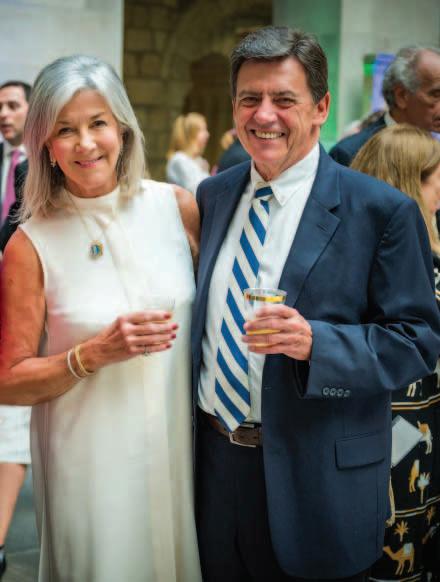










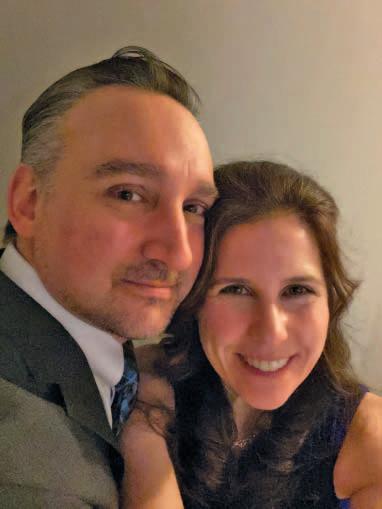
Holden residents Suzanne Campbell-Lambert and Scott Lambert have made WAM a part of their lives for decades. As a child, Scott attended art classes, and Suzanne has been a fan since her college days. As longtime Members, the couple’s involvement has grown over the years. Suzanne is past President of the Members’ Council and now serves as a Corporator and on the Corporator Nominating Committee. Scott is currently on the Members' Council, and both enjoy sharing their love of the Museum as informal “WAMbassadors.”
access: What made you decide to become Members of WAM? We wanted to support WAM’s continuing mission to connect people, communities, and cultures through the experience of art. We also knew that becoming Members would pay for itself in just a few visits! With our Benefactor membership, it’s easy to share WAM with others and we have the added benefit of reciprocal membership at many other museums.
access: What benefits of Membership do you appreciate the most? Apart from the special presentations and tour opportunities, the discounts are great. The savings at the Museum Shop and on WAM classes, plus the perks of free admission to Flora in Winter and the Spotlight Series, make being a Member even more valuable. The reciprocal membership encourages us to get out and explore other collections, too.
access: Which artworks or galleries are particularly special to you? We are always learning new things about the collection that add to our ever-growing list of favorites. Some include: the Chapter House (peaceful and balanced), Kato Tsubasa’s Torn (color and texture), and Terri Priest’s Static Variations: Blue x2 (magnetic and meaningful). We also couldn't wait to take in Fathom: The Art of Kat O'Connor. And Helmutt is a special treasure!
access: Why do you think art is important? Art is communication. It can build community, creating empathy and understanding across time, space, and circumstances. Each piece in this collection has a story to tell, a lesson to share, and WAM’s curators are very skilled at creating engaging exhibitions that let those voices be heard.
• RECEIVE free admission all year! Benefactor Members also receive reciprocal membership at select museums.
• GAIN free admission to Flora in Winter (March 2-5, 2023).
• ENJOY special tours, talks, virtual presentations, and sneak-peeks, just for Members.
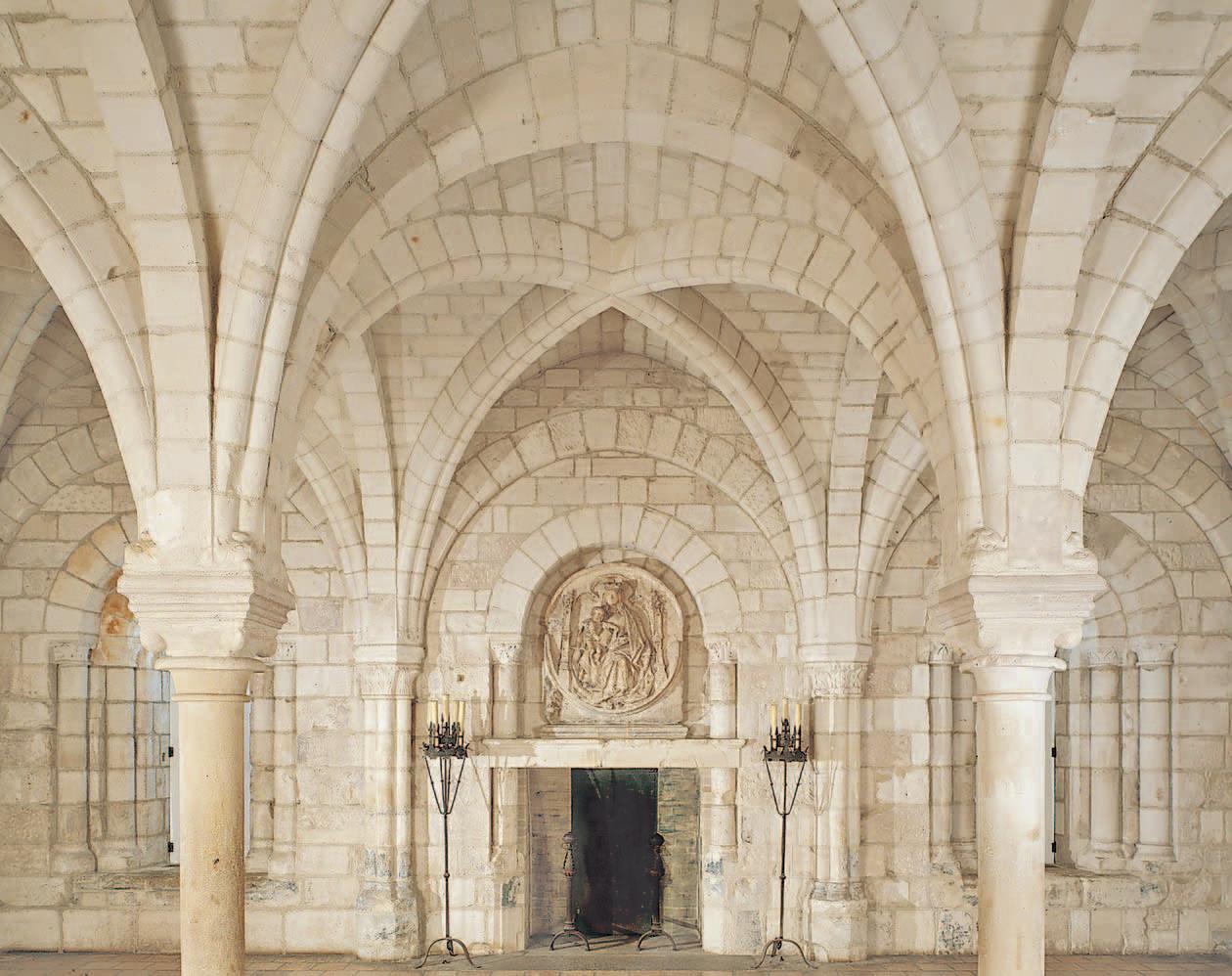
• EARN discounts in the Museum Shop and on tuition for studio classes.
Renew, upgrade, or purchase a gift membership online at worcesterart.org/join, email membership@worcesterart.org, call 508.793.4300, or stop by one of the Guest Services desks at WAM.
CHAIRMAN’S CIRCLE
$25,000+
Marianne and John Jeppson Family Mr. and Mrs. Theodore E. Shasta, Jr. Anonymous
PRESIDENT’S CIRCLE
$10,000 – $24,999
Lawrence H. Curtis and Marla Glanzer Curtis
Mary+ and Warner Fletcher Michael B. and Mary S. Fox # Barbara and Amos Hostetter Peter and Marty* Hurley Judith S. King Philip and Gale Morgan Clifford J. Schorer Cynthia Strauss+ and Harry Sherr Anonymous
DIRECTOR’S CIRCLE
$5,000 – $9,999
Charles P. Ball and Margaret McEvoy-Ball Jack and Susan Bassick Sarah and Allen Berry Eric Brose and Jan Seymour Douglas S. Brown and Jennifer RyanBrown Bill and Eileen Bush Dorothy Chen-Courtin Mr. and Mrs. J. Christopher Collins Charles H. N. de Végvár Jim and Carol Donnelly Allen W. Fletcher Mark and Jan Fuller Lisa Kirby Gibbs and Peter Gibbs Drs. Ivan and Noreen Green Arthur and Mary Kentros Mr. and Mrs. James V. Maloney Mahroo T. Morgan Martha R. Pappas Emily Rauh Pulitzer
Trudy Roybal and Dr. Steven Rowell Jonathan and Lisa Sigel Anne-Marie Soullière and Lindsey C. Y. Kiang George and Lynne+ Tonna Paul and Christina Villena Patricia and Paul C. Verderese
$2,500 – $4,999
Andrew Athy Karin I. Branscombe Mr. and Mrs. H. Paul Buckingham III Dr. and Mrs. Herbert Dean Margery Dearborn Henry B. and Jane K. Dewey Maria and John Dirlam Antonella and Roger Doucette Kathleen H. Gadbois Phyllis Harrington Dr. N. Alan Harris* and Dr. Diane Lebel James N. Heald 2nd
George Hecker
THANK YOU to the following Salisbury Giving Society members for providing one of the Museum’s most important sources of annual income. Through gifts of $1,500 or more ($750 or more for Contemporary Salisburys under age 40), Salisbury Member support is at the heart of our ability to sustain WAM’s mission and expand its impact.
Rita J. & Stanley H. Kaplan Family Foundation Margaret Keith David and Barbara Krashes Dr. George Krasowski and Theresa A. Quinn Claude M. Lee III Mary Beth Leonard Tom Logan and Sandy Hubbard Mark Mancevice Beth and Tom McGregor Dr. and Mrs.+ Glenn A. Meltzer Katharine+ and Henry* Michie Thomas S. Michie Marlene and David Persky Philip and Ellen Phillips Cynthia and Stephen Pitcher William and Lia Poorvu Edward* and Linda Robbins Frank and Nancy Selldorff Carolyn and Thomas Selldorff Kristin and Roger Servison Carol and Michael Sleeper Brian and Monique Spear George and Sheila Tetler Andrea Bettacchi Urban and Michael Urban Matthias Waschek and Steve Taviner Mark and Barb Wetzel Barbara Ketcham Wheaton
MEMBERS $1,500 – $2,499 & CONTEMPORARY MEMBERS $750+
Kim and David Adler Harold J. Albert and Francis X. De Nicola #
John B. and Mary Lou Anderson Drs. Julia Andrieni and Rob Phillips Marie and Mike Angelini Anthony and Barbara Trayers Athy Richard and Sharon+ Avis Joe and Kristin Bafaro Bradford D. Barker and Judith L. Pugh Brian* and Janet Barlow Joan T. Barry Thomas J. and Lynora S. Bartholomew Isa and Fred Bayon Whitney Beals and Pamela Esty Toni Begman Barbara C. Bernardin Lisa M. Bernat+ and Abram Rosenfeld Heath Drury Boote+ Ann Brown and Dominic Nompleggi* Dawn and John Budd Bettina L. Burr # George and Tammy Butler Thomas W. Caldwell
Jay E. Cantor # Donna Cohen Catherine M. Colinvaux and Philip D. Zamore
Jim and Margaret Collins James J. Convery and Tracy A. Craig Michael F. Collins, M.D. The Martha A. Cowan Fund William and Ellen Cross # Chris and Betsy Crowley Bruce and Kim Cutler Dix and Sarah Davis Laurie and Phil Davis Janet Andreson Dealy Glenn C. DeMallie Nina Chapin de Rochefort David DiPasquale and Candace Okuno
Tom Dolan Kent dur Russell and Aisling Gaughan Marillyn and John Earley Sandy and David Ekberg Frederick and Patty Eppinger # John and Jeanne Esler Andy and Robin Feldman Dr. Marianne E. Felice Allen and Yda Filiberti Susan M. Foley Joan and Richard Freedman Paul J. Giorgio Jennifer C. Glowik-Adams Elaine and Stephen Gordon Dr. Gabriele M. Goszcz+ Janet and Geoff Graeber Maureen and Bob Gray David R. and Rosalie A.* Grenon J. Michael and Brittany Grenon Eve Griliches R. John Groves and Susan M. Groves Dr. Thomas and Patricia Halpin John W. Hardin, M.D. Deirdre Healy and Larry Vidoli # Jock Herron and Julia Moore Janice Hitzhusen and Jim Pease Dr. James and Kathleen M. Hogan Emily and James Holdstein Leigh Catherine Hudson # Elena Hutchinson Drs. David and Kathee Jordan Amar V. Kapur Evelyn Karet, Ph.D. Margaret Kavalaris John F. and Rayna Keenan Maureen and William Kelleher Jean King and Carl Fulwiler Mark Labbe # James and Anne Lang Mr. and Mrs. John P. Lauring Albert and Anna LaValley Ann T. Lisi and Joel P. Greene Mr. and Mrs. Bruce D. Little Siting Liu # Ronald and Angela Lombard Stephen and Valerie Loring Joseph and Bonnie Losavio Dr. Paul J. Mahon Robert and Minh Mailloux Dr. Sohail and Mona Masood
Carolann McAdam #
Mr. and Mrs.+ Neil McDonough Kevin and Martha McKenna
Dr. Satya and Mrs. Supriya Mitra Sandra Moose
Michelle Morneau
James and Patricia Moynihan Moira+ and Charlie Manoog Emily P. Murray
Charlene L. Nemeth
Stephanie Opalka # Robert G. Oriol
Edward Osowski
Susan+ and Chris Palatucci
The Parafestas Family
Fred and Christine Parson Thoru and Judith Pederson Deborah A. Penta
Mr. and Mrs. N. William Pioppi
The Plourde Family Charitable Trust Dr. Phyllis Pollack
Arthur and Debra Remillard Luanne Remillard
Sarah and Joe Ribeiro
Dr. Ruthann Rizzi and Edwin J. Barr Shelley and Todd Rodman Malcolm Rogers
Mr. and Mrs. Henry B. Rose Leah Rothstein Nancy Runkle #
John Savickas
Peter and Anne* Schneider Patricia A. Segerson
Jeanice Sherman and Dwight Johnson Sara Shields and Bruce Fishbein Dr. Shirley S. Siff Martha Simmons
Dr. Jang B. Singh
Renee and James J. Skeffington, Jr. Mark Spuria Robin and Christopher Starr
Mr. and Mrs. John C. Stimpson Katy and Peter Sullivan Tony and Martha Tilton Judith C. Vaillancourt Judith Vander Salm Kristin Waters+ Roger and Elise Wellington
James A. Welu
Bernard M. Whitmore
Robin and Wallace Whitney Peter and Shirley Williams Emily Wood
Susan and David Woodbury
Dr. Edward C. Yasuna
Gwill York and Paul Maeder Valerie Zolezzi-Wyndham 5 Anonymous (1 new Member)
* Deceased
# New Salisbury Members
+ Salisbury Committee Members
As of August 31, 2022
In appreciation of their generous support, the Museum offers Salisbury Giving Society donors opportunities to connect with the heart of WAM, its collections, and staff, including:
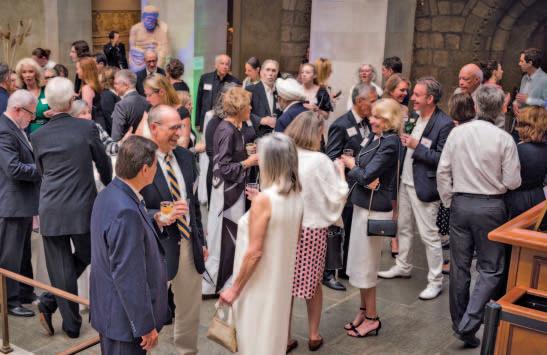
•In-person and virtual events with WAM’s Director and Curators
•Special access to Flora in Winter and exhibition openings
•Museum trips led by WAM Curators
•Complimentary admission and discounts at WAM
•Reciprocal admission at over 1,400 museums throughout North America
Upcoming Salisbury Giving Society Programs (Subject to change) Curator-Led Trip to the Davis Museum October 13, 2022
Claire C. Whitner, WAM’s Director of Curatorial Affairs and the James A. Welu Curator of European Art, will lead Salisbury Members on a tour of the permanent collection at the Davis Museum in Wellesley. The tour will be followed by lunch at a local restaurant and transportation will be available.
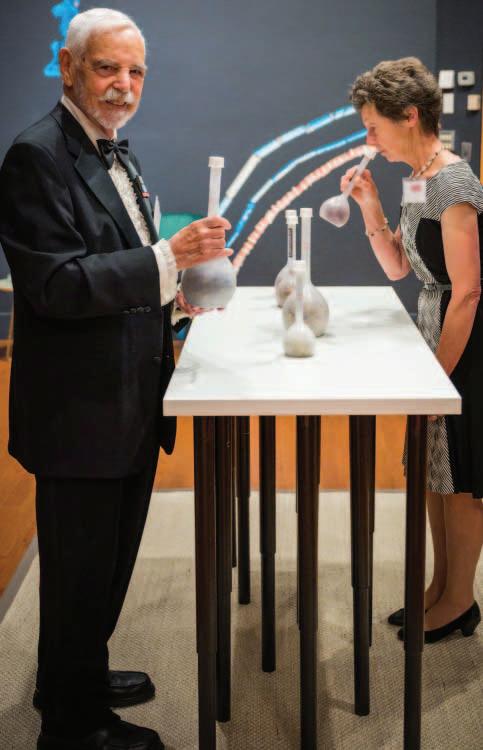
Salisbury Evening November 4, 2022
Join Matthias Waschek, Jean and Myles McDonough Director and fellow Salisbury Members for a festive evening at the Museum, including a special guest speaker and an elegant cocktail reception in the Renaissance Court. Cocktails with the Curators Virtual Event February 2, 2023
Learn more about WAM's new exhibition, The Floating World: Japanese Prints from the Bancroft Collection in a special Zoom presentation for Salisbury Members.
Sarah and Joaquim “Joe” Ribeiro believe that they get as much out of the Museum as they put into it. And, they have contributed much to WAM and the Worcester community. Shortly after moving to the area from Hawaii in 1976, Sarah became a WAM Member. Over the years she deepened her involvement with the Museum, serving in many roles including docent, President of the Members’ Council, Corporator, and Trustee. She has long served as one of the co-chairs of WAM’s widely-loved Flora in Winter. Joe’s connections to Worcester run deep, having graduated from WPI in 1958 and spent most of his career working in the Worcester area. The Ribeiros are longtime members of the Salisbury Giving Society and the Legacy Society.
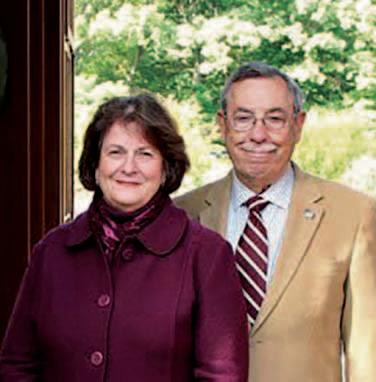
The Ribeiros have always admired the Museum’s breadth of artworks and its challenging and impressive exhibitions. Sarah’s favorite part of the permanent collection is the Dutch paintings, with their layers of visual and artistic mastery and elaborate storytelling; a close second is the Museum’s contemporary art collection. Sarah is drawn to how contemporary artists create personal expression based on what is going on around them. She feels as if both forms of art, although different, are also ways to learn. Sarah is a lifelong learner and has taken many WAM history classes. She and Joe value the Museum’s commitment to art instruction and education, a driving factor in their decision to share their time, talent, and resources with WAM. Through their membership in both the Salisbury Giving Society and the Legacy Society, the Ribeiros provide essential unrestricted support and help ensure that the Museum is a vibrant institution delivering transformative experiences for today’s visitors and future generations. We are thankful to Sarah and Joe for their dedication to the Worcester Art Museum and to the Worcester community!
For questions or more information about the Salisbury Giving Society, please contact Katy Sullivan, Manager of the Salisbury Giving Society at KatySullivan@worcesterart.org or 508.793.4325.
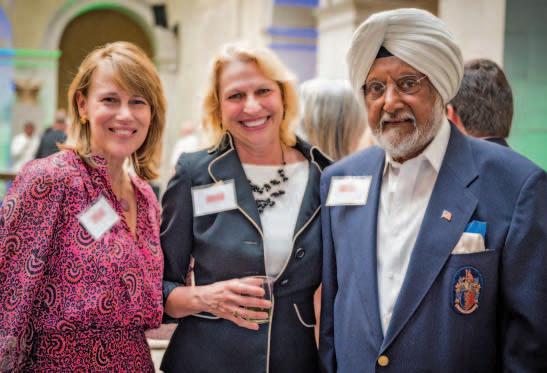
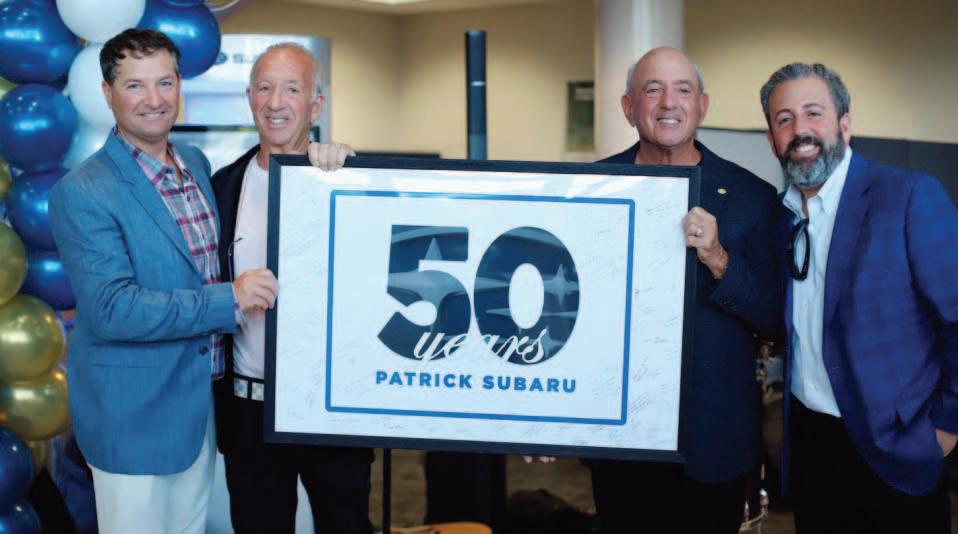

These companies know that supporting the arts means good business.
We thank them for their support.
“
As owners of an art gallery and antiques store in Westborough, MA, Mark and I feel the necessity to support art organizations close to home and to our business. I have lived in Westborough for eight years. It took me some time to realize Worcester’s potential as a regional art hub. I stubbornly kept looking east for art and entertainment until one day I took my son to a concert of Apollo’s Fire at Tuck erman Hall. While looking for parking I noticed a museum just around the corner. Next weekend we went to see the Worcester Art Museum, and we had a very pleasant experience, especially taking into account that my son was then a nine-year-old active boy.
As for Mark, he settled in Westborough at the beginning of the pandemic. Art connoisseur and native of Cambridge, MA, which is an art hub of its own, but also a father of another young and active boy, he knew better than anybody that art and artistic experience must be introduced to our chil dren in consistent, but small doses. WAM became our #1 post-pandemic art outings’ destination. WAM has a high-quality collection while staying a “human size” museum where no one can be lost. We are happy to support it in any way we can.”
— Anna Leduc, Leduc Art and Antiques, Owner
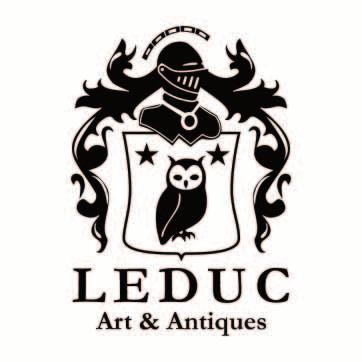
“Patrick Motors is proud to be a Business Partner with the Worcester Art Museum. Our company, since its founding in 1936, has always seen great value in supporting local organizations like the Worcester Art Museum. Given the profound impact that WAM has had on our area’s culture, this business partnership simply makes sense, as two organizations who have been a part of this community for the past century. We look forward to continuing this partnership in the future and look forward to seeing all that WAM has to offer in the coming months.”
David Patrick, OwnerBECOME
worcesterart.org/join
For information about how your company can co-brand with WAM through a Business Partnership or Sponsor ship, contact Heather Walker at 508.793.4324 or HeatherWalker@worcesterart.org.
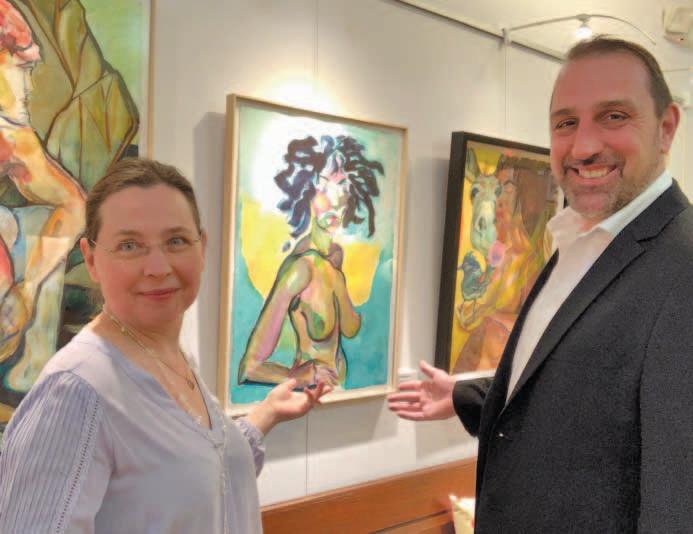
$25,000+
Samuel Adams
$10,000+
AbbVie
Bonhams Skinner
Cornerstone Bank Country Bank
Fallon Health FLEXcon
Gilbane Building Company
The Hanover Insurance Group Foundation Interstate Specialty Products, Inc.
Saint-Gobain
UMass Memorial Health Care UniBank Unum WinnCompanies Workers Credit Union
$5,000+ Berkshire Bank Bowditch and Dewey, LLP Digital Federal Credit Union (DCU) Imperial Distributors, Inc.
Kaplan Construction Patrick Motors
Rand-Whitney Container Reliant Medical Group Rockland Trust Webster Five
Worcester Business Journal
$2,500+
Herbert E. Berg Florist, Inc.
The BHR Life Companies
The Boston Globe
CCR Wealth Management, LLC Christie's Fletcher Tilton PC Foley Incorporated
Gaudette Insurance Agency
iHeart Radio, 961 SRS & WTAG
Lamoureux Pagano Associates | Architects Mirick O’Connell
WBUR
MEMBERS
$1,000+
AAFCPAs
Avidia Bank
J.J. Bafaro, Inc. Bartholomew & Company, Inc.
The Berry Machnowski Team │ Moneta Group Blue Cross Blue Shield of Massachusetts Central One Federal Credit Union Cole Contracting, Inc. Columbia Tech Cutler Capital Management, LLC
Data Source, Inc.
Davis Publications, Inc.
Fiduciary Investment Advisors, LLC
Gatorade
Green Leaf Construction Greenberg, Rosenblatt, Kull & Bitsoli, P.C.
Harvard Pilgrim Health Care Kelleher and Sadowsky Associates, Inc.
Leduc Art & Antiques
Mercier Electric Co., Inc. Miles Press, Inc.
Russell Morin Catering and Events J.S. Mortimer, Inc.
New England Disposal Technologies, Inc. PENTA Communications, Inc. Peppers Artful Events
Polar Beverages
Quaker Special Risk Risk Strategies Company Rollstone Bank and Trust Seder and Chandler, LLP Sentinel Benefits & Financial Group Seven Hills Foundation Joffrey Smith Financial Group Southgate at Shrewsbury Spectrum Health Systems, Inc. Sullivan Benefits Sunshine Sign Company, Inc. Stephen F. Wentzell, CPA Thomas J. Woods Insurance Agency, Inc. Wings Over Worcester
$500+ Action! by Design Bay State Savings Bank Bisceglia, Steiman & Fuderman, LLP Burr Insurance Agency, Inc. Buyer’s Meeting Point, LLC Callahan Fay Caswell Funeral Home Coghlin Electrical Contractors, Inc. Arthur Cole Painting Corporation Concordia Exchange ConForm Lab Cryogenic Institute of New England, Inc. Erland Construction Fontaine Brothers F.W. Madigan Company, Inc. George's Coney Island Grimes & Company Leadership Transitions, LLC MSW Financial Partners NAI Glickman, Kovago & Jacobs Northwood Insurance Agency, Inc. Nypro, Inc. Sotheby's Struck Catering Sullivan, Garrity & Donnelly Insurance Agency, Inc. The Willows at Worcester Tufts Health Plan
As
Right:
Egyptian,

Alexander H. Bullock,
1076-655
The Legacy Society was formed to recognize those individuals who have included the Worcester Art Museum in their will or estate plans. These generous and visionary Members ensure that the Museum is a vibrant institution that will deliver transformative experiences for future generations. We are grateful to the following individuals who have either left a legacy gift or have included the Museum in their estate plans, thereby making WAM a priority during their lifetime and beyond:

Mr.* and Mrs. William C. Arthur Jr. Toni Begman
Sarah and Allen Berry
Philip H. Brewer
Dr. Elaine and Mr. Robert* Bukowiecki Alexandra Cleworth and Gary Staab Susan C. Courtemanche Dix and Sarah Davis
Brenda Verduin Dean
Margery Dearborn
Robert A. DeLuca
Patricia and Richard Desplaines, Jr. Henry B. and Jane K. Dewey Maria and John Dirlam
Andrea N. Driscoll
Heath Drury Boote
Stephen C. Fitzsimmons
Dr. James and Mrs. Kathleen Hogan Frances* and Howard Jacobson Peter Jefts
Lisa Kirby Gibbs and Peter Gibbs Joan Peterson Klimann David and Barbara Krashes
Marcia Lagerwey and Loren Hoekzema Claude M. Lee III
Dr. Paul J. Mahon
Jodie and David Martinson
Mr.* and Mrs. Robert K. Massey Dr. and Mrs. Glenn A. Meltzer Linda and John* Nelson Edward J. Osowski Sarah and Joe Ribeiro
Mr. and Mrs. Henry B. Rose Mr.* and Mrs. Sidney Rose Ruth R. Rubin Jennifer L. and Richard E. Saffran
Dr. Peter B. Schneider
Dr. Shirley S. Siff and Robert M.* Siff Mary Skousgaard Mr.* and Ms. Jack Tobin
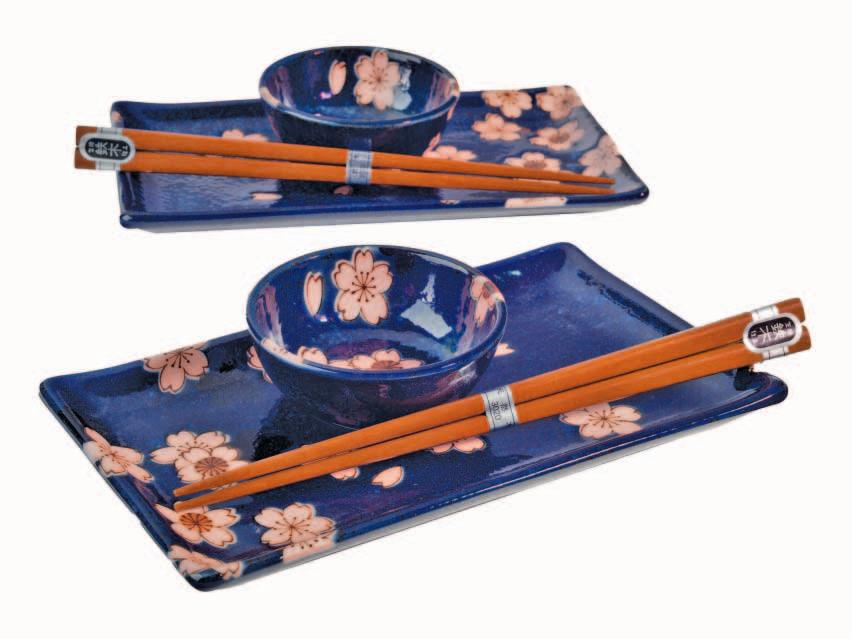
Mrs. Margery A. Adams Harriet A. Alexander Ann Baumann
Mr. and Mrs. Howard M. Booth Karl and Dorothy Briel
Eleanor H. Burke
Douglas P. Butler
Dr. and Mrs. William T. Carleton William R. Carrick Mrs. Fairman C. Cowan
Jeanne Y. Curtis
Mary S. Cushman
Janet B. Daniels
Eleanor Daniels Bronson Hodge
Shirley Look Dunbar
Michael E. Economos
Cathleen C. Esleeck
James E. Lowell
Maurice I. Hurwitz
Mr. and Mrs. I. R. Freelander
Esther and Howard Freeman
Eleanor M. Garvey
Judith S. Gerrish
Robert D. Harrington, Jr. Mrs. Milton P. Higgins John and Marianne Jeppson
Britta Dorothy Jeppson
Mary Patricia Keasbey
Sarah Bramson Kupchik
Irving and Marie Lepore
Anne Lewis
Sara Mallard
Myles and Jean McDonough Ellen E. McGrail
Don and Mary Melville
Henry T. Michie
Jean H. Miles
Mrs. David J. Milliken
Mrs. Anne (Nancy) Morgan
Haim G. Nagirner
Viola M. Niemi
Mary Ann Horner Pervier
Marilyn E. Plue
Richard Prouty
Mr. and Mrs. Chapin Riley
Blake Robinson
Louise and Elijah Romanoff
Agnes B. Russfield
Leonard B. Safford
Edith Safford
Katherine Sawyer
John. R. Scarborough
Norman L. Sharfman
Hope and Ivan Spear
Helen M. and Thomas B. Stinson
Helen E. Stoddard
Lois Tarlow
Madeline Tear
Richard S. Teitz
Hester N. Wetherell
Margaret Ray Whitney
Irving N. Wolfson, M.D.
Mrs. Ledlie L. Woolsey
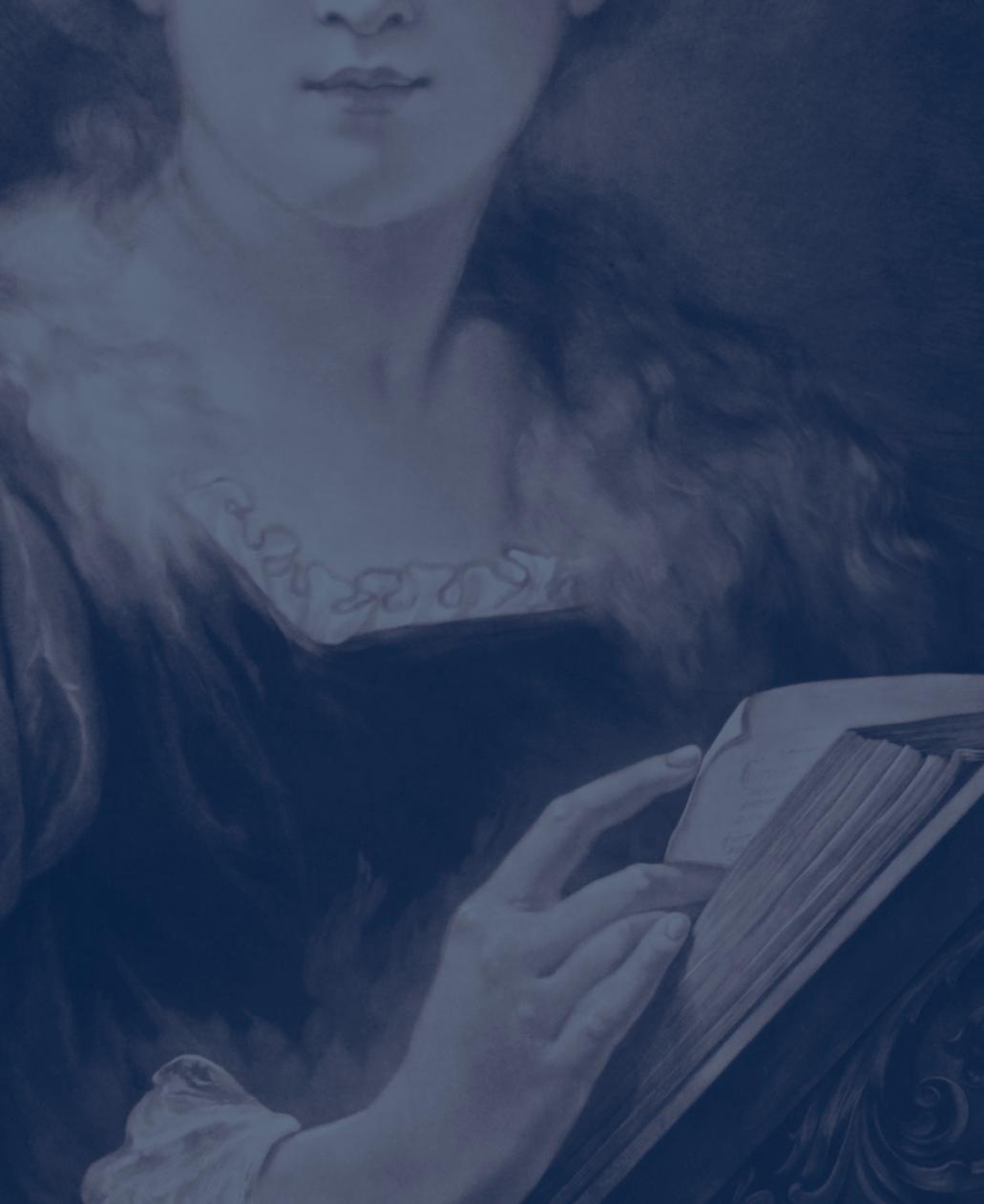
Elton Yasuna
If you are interested in naming the Worcester Art Museum in your will or estate plans, or already have, please visit worcesterartlegacy.org, or contact the Development Office by calling 508.793.4363 or emailing us at EmilyIsakson@worcesterart.org.
HeatherWalker@worcesterart.org
The Worcester Art Museum gratefully acknowledges the following foundations and government agencies for their support during fiscal years 2021 and 2022 (as of 8/23/22).
We are grateful to the many local and national foundations that make our work possible and sustain the Museum’s innovative exhibitions, public programs, and educational and community endeavors, as well as maintain and improve our facilities.
George I. Alden Trust
Bill and Joan Alfond Foundation
American Endowment Foundation
Art Bridges
Bank of America Charitable Gift Fund

Barr Foundation
Bassick Family Foundation
Benevity Community Impact Fund of the American Endowment Foundation


The Blackbaud Giving Fund
Boston Foundation
Patrick and Aimee Butler Family Foundation

E. Rhodes and Leona B. Carpenter Foundation
Jeanne Y. Curtis Foundation
The Melvin S. Cutler Charitable Foundation
Fred Harris Daniels Foundation
Dirlam Charitable Trust
Ruth H. and Warren A. Ellsworth Foundation
J. Irving England & Jane L. England Charitable Trust
Sherman Fairchild Foundation, Inc.
Fidelity Charitable Gift Fund

Fidelity Foundation
FJC Foundation
Fletcher Foundation
George F. and Sybil H. Fuller Foundation
Greater Worcester Community Foundation
Hanover Insurance Group Foundation, Inc.

The Richard A. Heald Fund
Bradley C. Higgins Foundation
John W. & Clara C. Higgins Foundation
Highland Street Foundation
Hoche-Scofield Foundation
Institute of Museum and Library Services
Rita J. & Stanley H. Kaplan Family Foundation, Inc.
Worcester Art Museum was founded on a passion for art and community made possible through philanthropy. For nearly 125 years, the Worcester Art Museum has relied on the generosity of donors who believed in the value of the Museum. We honor and recognize the following families, who have supported the
Ruth and John Adam, Jr. Exhibition Fund
George I. Alden Trust Assistant Director of Education Fund
George I. Alden Trust Docent Education Fund
Harriet B. Bancroft Fund
S.N. Behrman Library Fund

Sally Riley Bishop Fund
Barbara A. Booth Flower Fund
Karl L. and Dorothy M. Briel Library Fund
Alexander H. Bullock Fund
Burrow Movie Fund
Isabel Baker Carleton Memorial Fund
Abbie S. and Mildred L. Cather Fund
Douglas Cox and Edward Osowski Fund for Photography
Dorothy Frances Cruikshank Education Fund
Charles E. Culpeper Conservation Laboratory Fund
Dwight A. Davis Fund
Alexander and Caroline Murdock DeWitt Fund Docent Education Fund
Ruth and Loring Holmes Dodd Fund
Frank F. Dresser Fund
Theodore T. and Mary G. Ellis Fund
J. Irving England & Jane L. England Charitable Trust
David Freelander Memorial Education Fund
David J. Freelander Scholarship Fund
George F. and Sybil H. Fuller Conservation Fund
Thomas Hovey Gage Memorial Fund
Austin S. Garver Fund
Sarah C. Garver Fund
Edward F. Goggin Fund
Nehemias Gorin Foundation Fund
Greater Worcester Community Foundation Booth Family Fund for Education and Outreach
Martha A. Cowan Fund
Jeppson Memorial Fund
Louise R. and John F. Reynders Fund Marvin Richmond Fund
Chapin Riley Fund
Helen M. and Thomas B. Stinson Fund Nathan and Barbara Greenberg Discovery Fund Nathan and Barbara Greenberg Education Fund
Amelia and Robert H. Haley Memorial Lecture Fund

Charles A. Hamilton Fund
Richard A. Heald Curatorial Fund
Edith Florence Hendricks Scholarship Fund Herron-Dresser Publications Fund
Chester D. Heywood Scholarship Fund
Hiatt FAME Fund
To learn more about WAM’s institutional priorities and ways that foundations and government agencies might assist, please contact Christine Proffitt, Senior Manager of Institutional Giving, at ChristineProffitt@worcesterart.org.
The Judy and Tony King Foundation
The Kirby Foundation
The Klarman Family Foundation
Carl Lesnor Family Foundation
Henry Luce Foundation
Lunder Foundation—Peter and Paula Lunder family
The Manton Foundation
Mass Cultural Council – Cultural Districts Initiative
Mass Cultural Council – Cultural Investment Portfolio
Mass Cultural Council – Universal Participation Initiative
Massachusetts Cultural Facilities Fund

Mass Humanities
MassDevelopment
Jean and Myles McDonough Charitable Foundation
Mildred H. McEvoy Foundation
The Murray Family Charitable Foundation
National Endowment for the Arts
National Endowment for the Humanities
National Philanthropic Trust
Paine Charitable Trust
Arthur M. and Martha R. Pappas Foundation
Amelia Peabody Charitable Fund
Joseph Persky Foundation
Rockland Trust Charitable Foundation
Schwab Charitable Fund
The Schwartz Charitable Foundation
Stoddard Charitable Trust
Terra Foundation for American Art
TIAA Charitable Gift Fund
Worcester Arts Council
Worcester Educational Development Foundation, Inc.
Wyman-Gordon Foundation

Museum by creating endowed funds. The income produced by these funds is used to support the purposes communicated by the donor. These funds provide important financial support to WAM and its programs. The Museum is grateful for this enduring legacy of support provided by the following endowed funds:
Jacob Hiatt Scholarship Fund
Higgins Armory General Endowment Fund
The Higgins Curator of Arms and Armor and Medieval Art Endowment Fund
Hoche-Scofield Foundation
Christian A. Johnson Discovery Fund
Christian A. Johnson Exhibition Fund
The Christian A. Johnson Resource Center Fund
Frances A. Kinnicutt Fund
Philip Klausmeyer Conservation Fund
Joseph and Shirley Krosoczka Memorial Youth Scholarship Fund
Macomber Conservation Fund
Jean and Myles McDonough Director Endowment Fund
Andrew W. Mellon Foundation Conservation Fund

Don and Mary Melville Contemporary Art Fund
Michie Family Curatorial Fund
John M. Nelson Fund
Paine Charitable Trust
Eliza S. Paine Fund
Susan Ella Reed-Lawton Fund
Arthur J. Remillard, Jr. Youth Education Fund
Romanoff Education and Library Fund
Marion Olch Ruhman Education Fund
William S. Sargent Fund

Norman and Dorothy Sharfman Education Fund
Helen Sagoff Slosberg Fund
Ethel M. Smith Education Fund
Spear Fund for Public Programs
Stoddard Acquisition Fund
Stoddard Associate Curator of Prints, Drawings, and Photographs Endowment Fund
Stoddard Charitable Trust Directors Fund
Stoddard Discovery Fund
St. Wulstan Society Fund
Sudbury Foundation Scholarship Fund
Alice Eliza Waite Memorial Fund
Miriam Washburn Trust Fund
Karl B. A. Wass/Lundquist Family Scholarship Fund
James A. Welu Curator of European Art Fund
Mary Louise Wilding-White Fund Worcester Art Society
The Worcester Art Museum is grateful to our corporate sponsors for understanding the value of making the Museum’s exhibitions, projects, and programs possible.
Bernard G. and Louise B. Palitz Fund Hall and Kate Peterson Fund
Mary E. and Irene L. Piper Scholarship Fund
If you are interested in establishing a fund, please call 508.793.4363.
For more information about how your company can co-brand with WAM through a Business Partnership or Sponsorship, contact Heather Walker at 508.793.4324 or HeatherWalker@worcesterart.org.
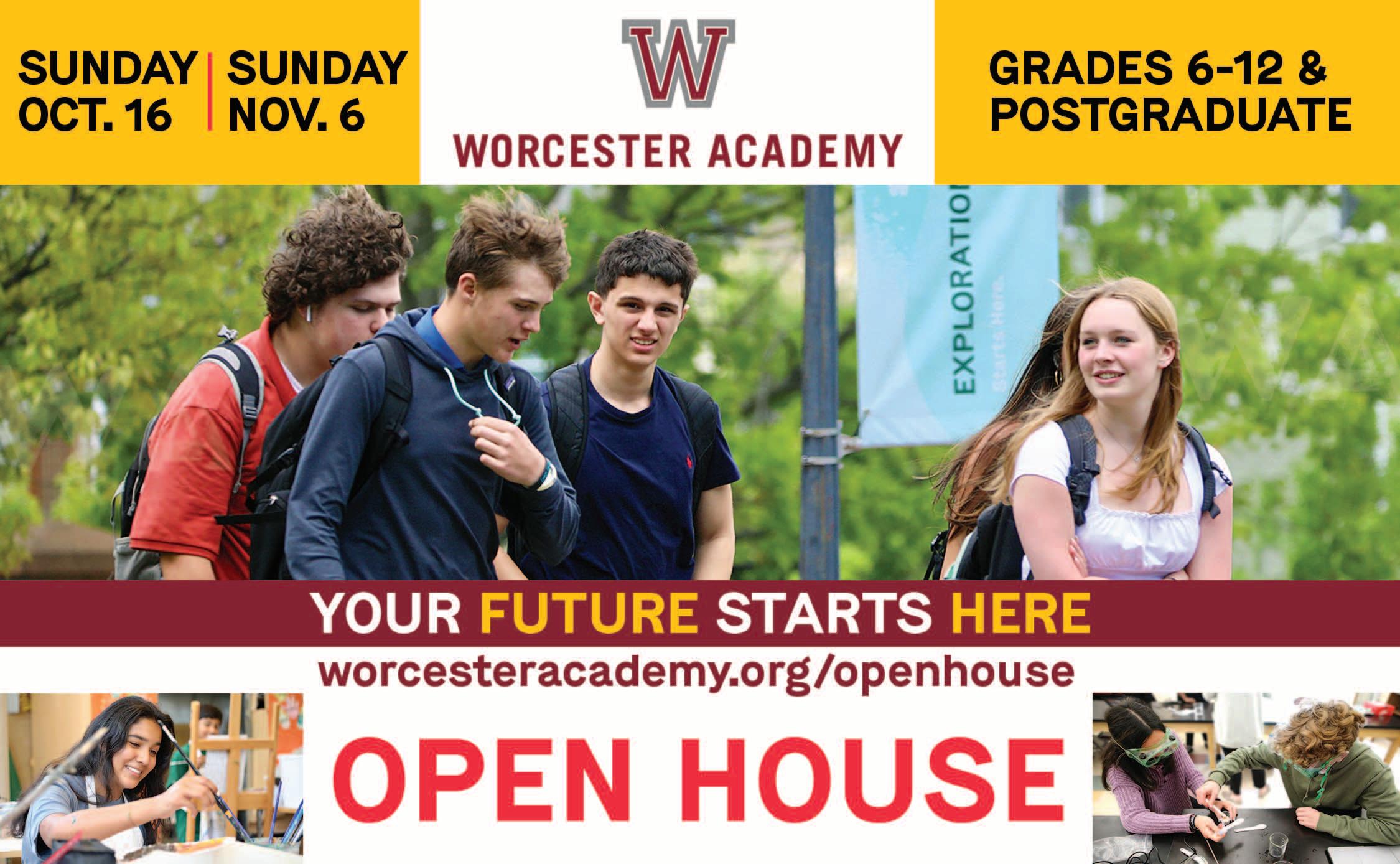
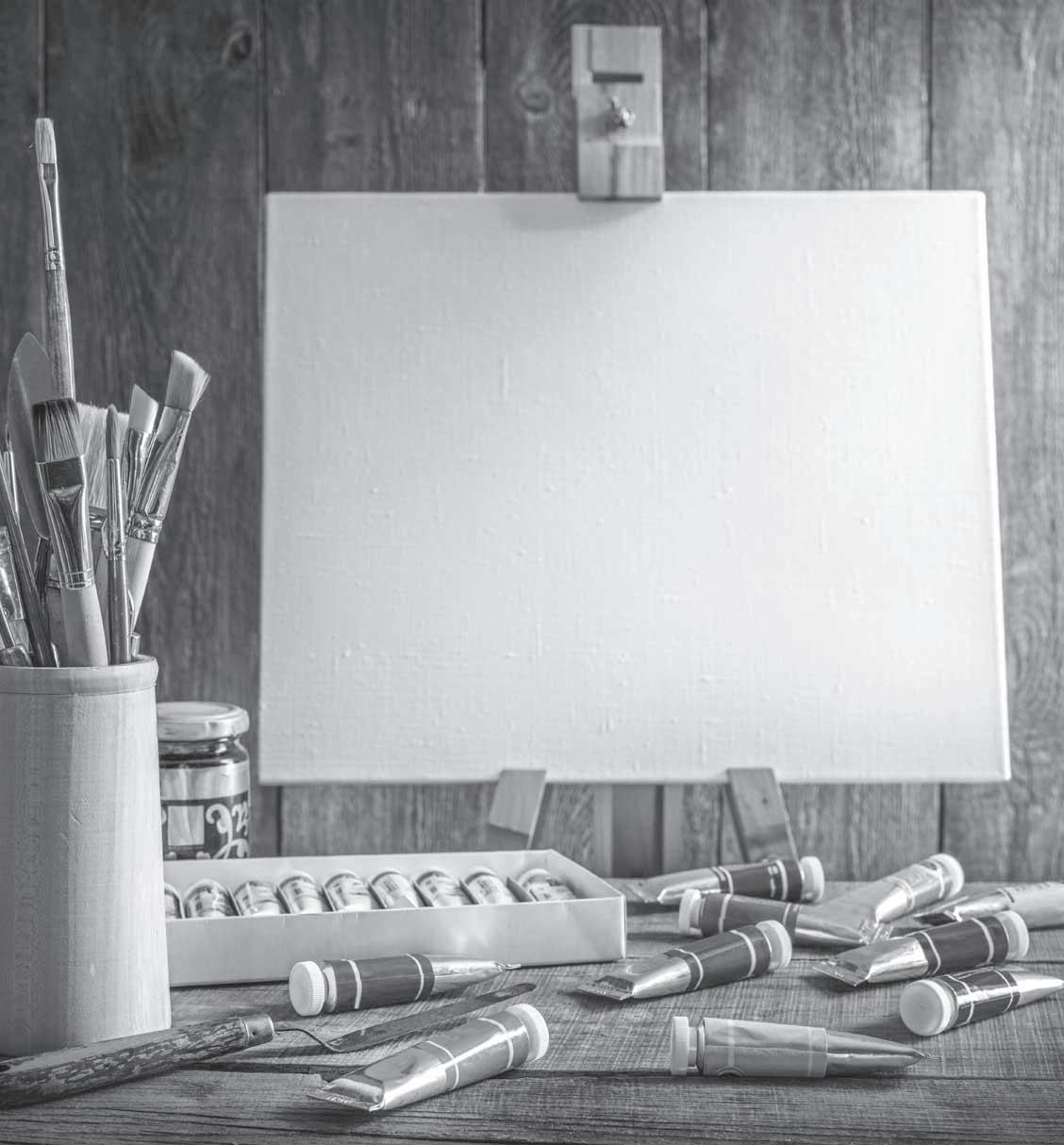


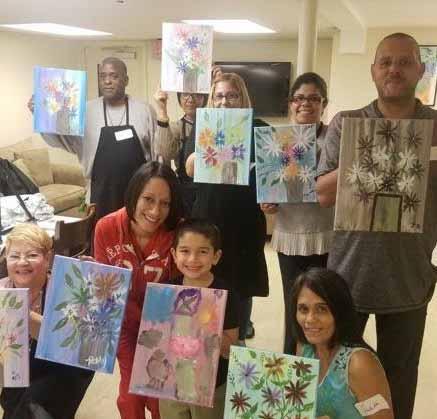
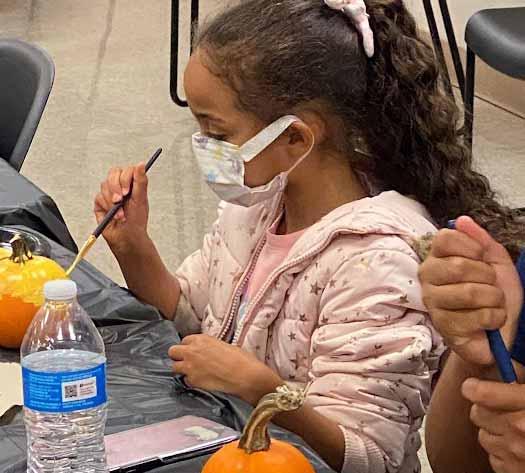
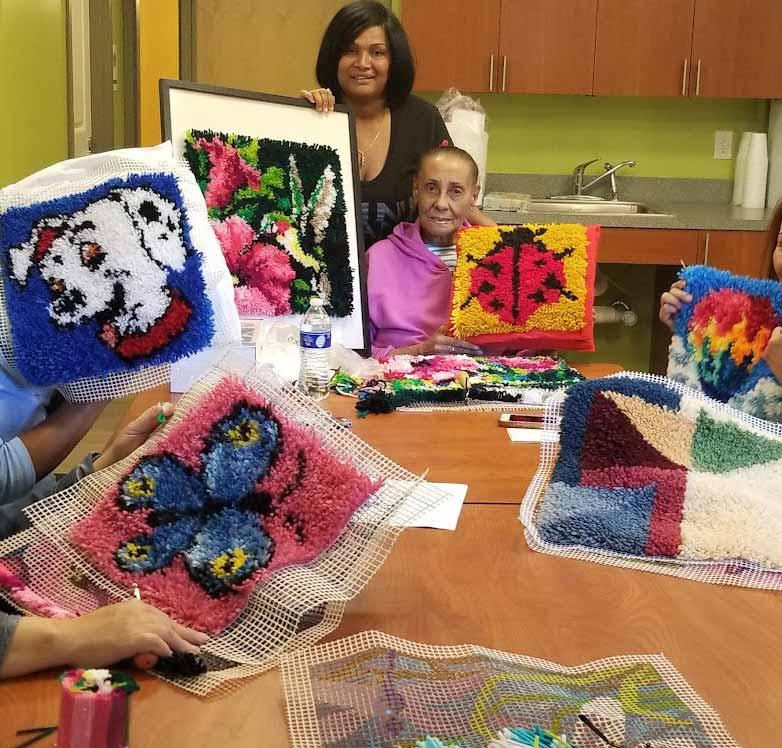
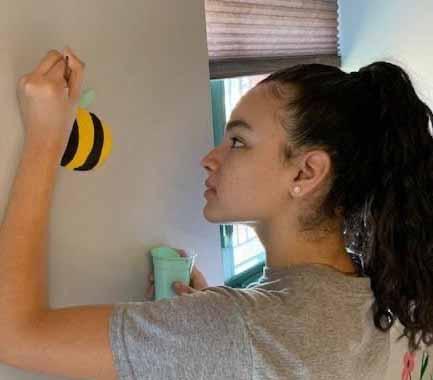
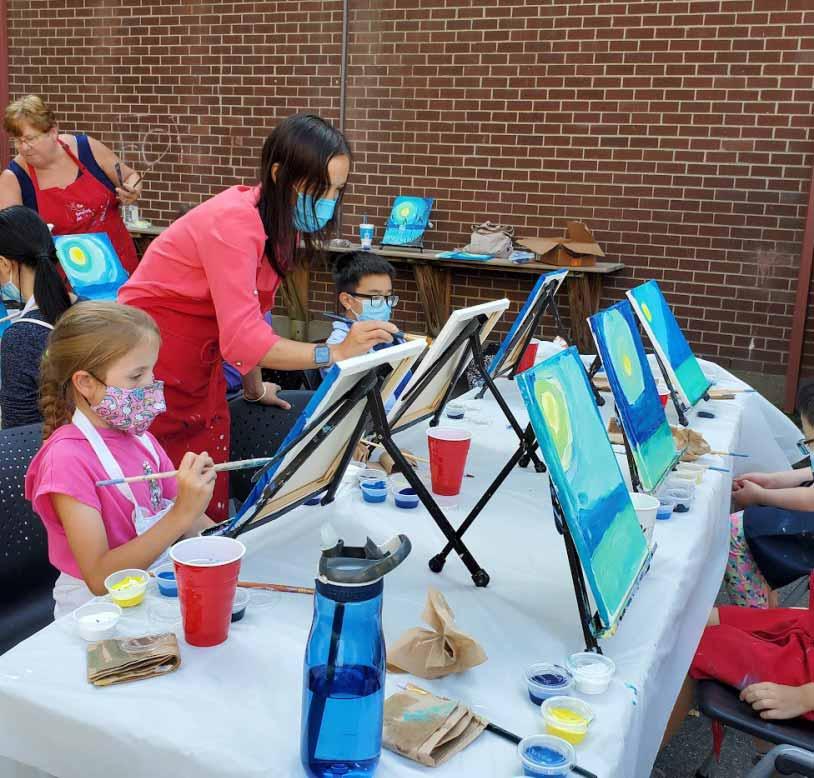
As the nation’s leading manager and developer of affordable housing, WinnCompanies understands building empowered, connected communities.
WinnCompanies is proud to partner with the Worcester Art Museum to cultivate connections, promote social justice, and inspire change through creative expression.
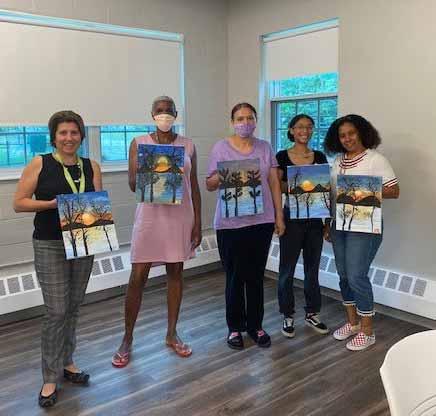

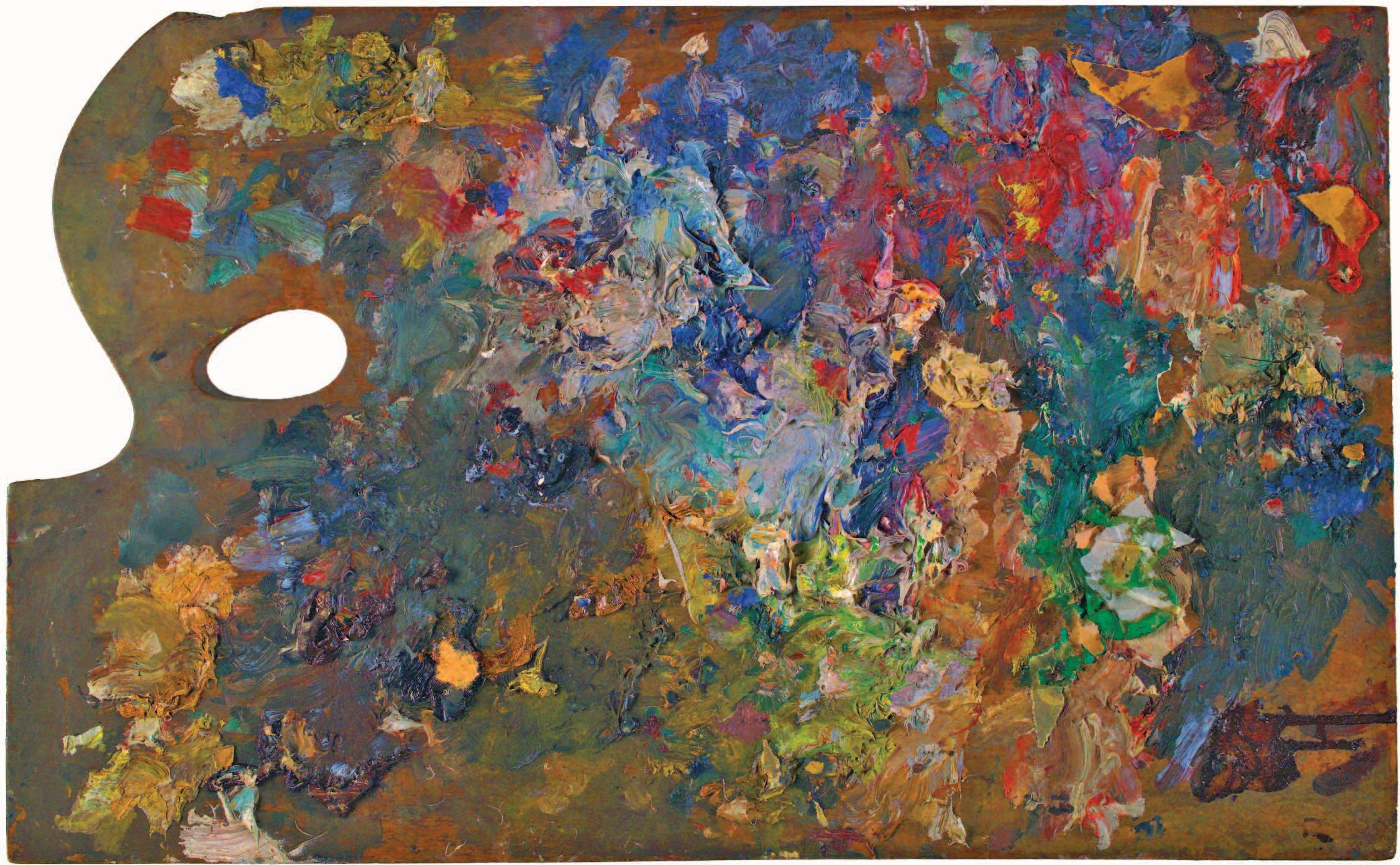
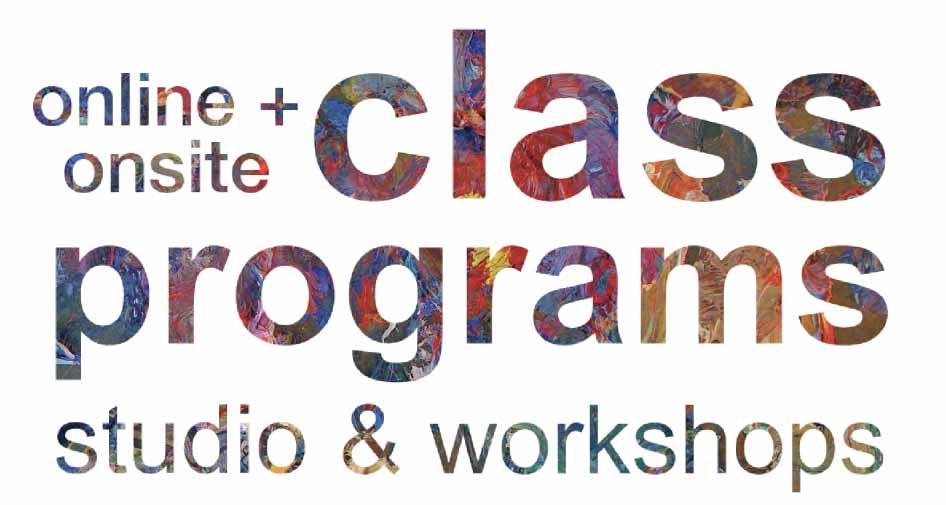
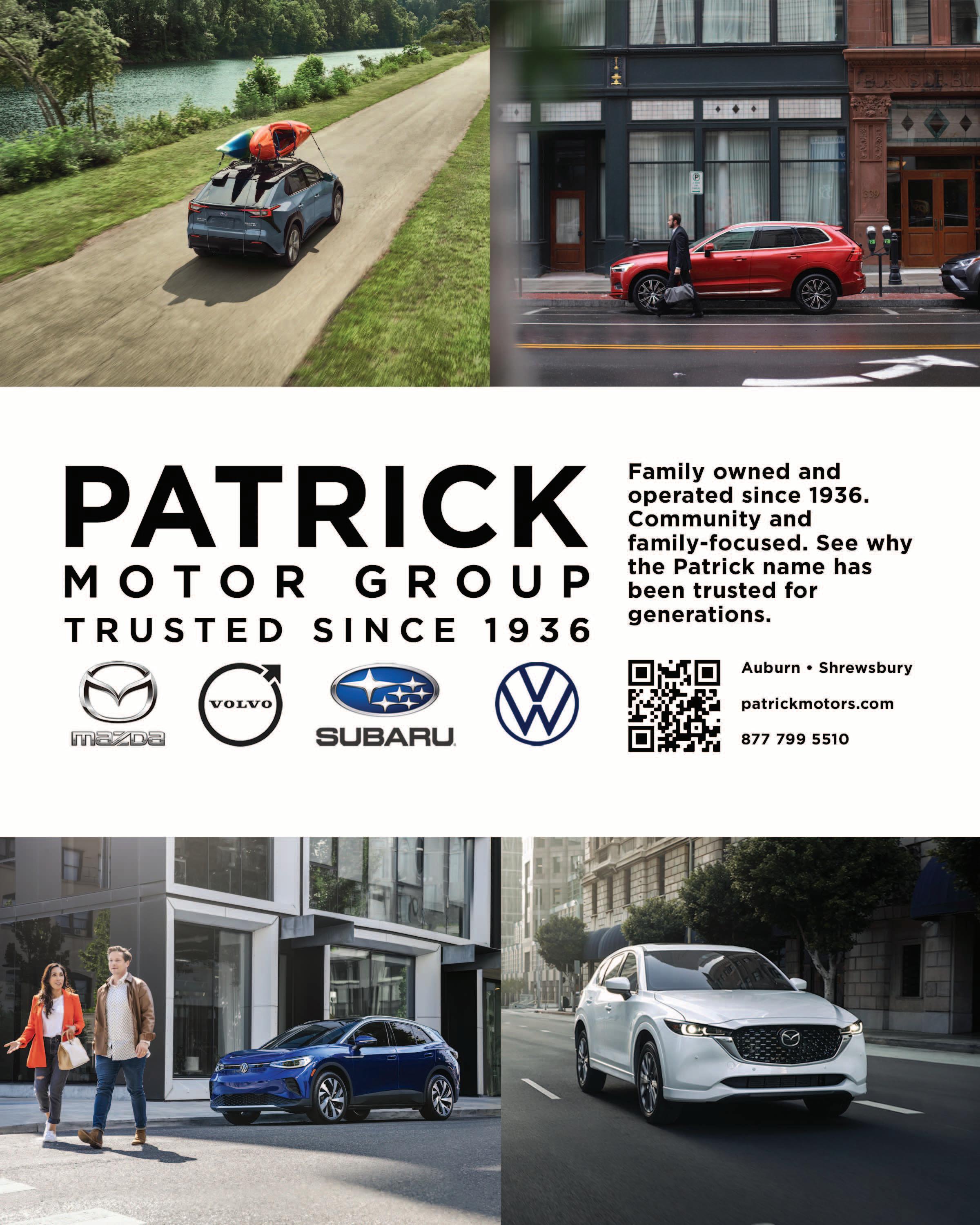
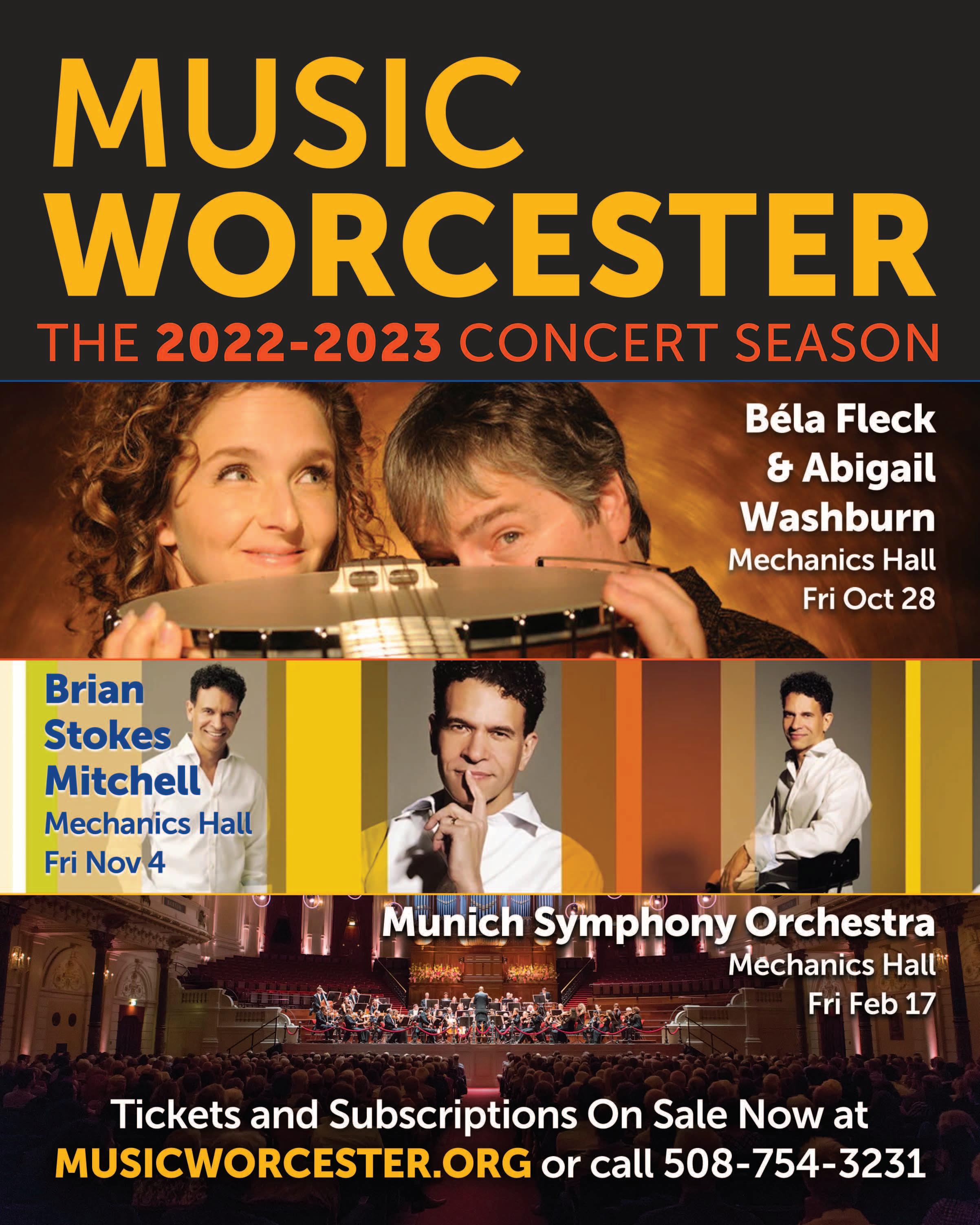

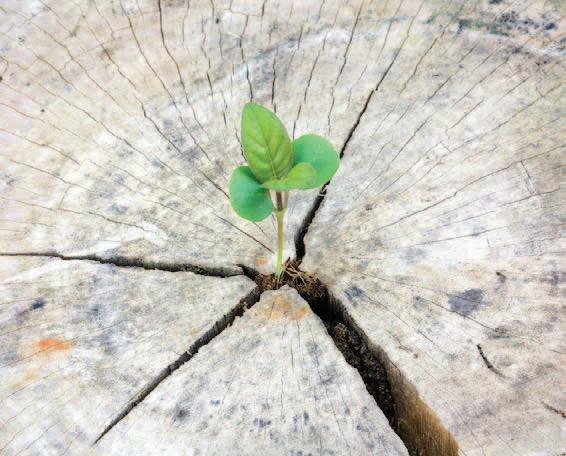


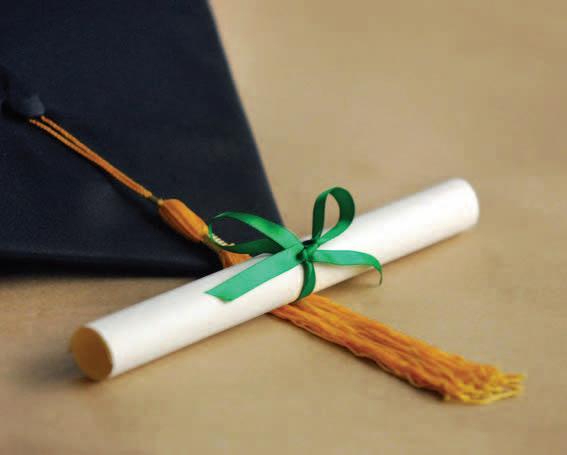

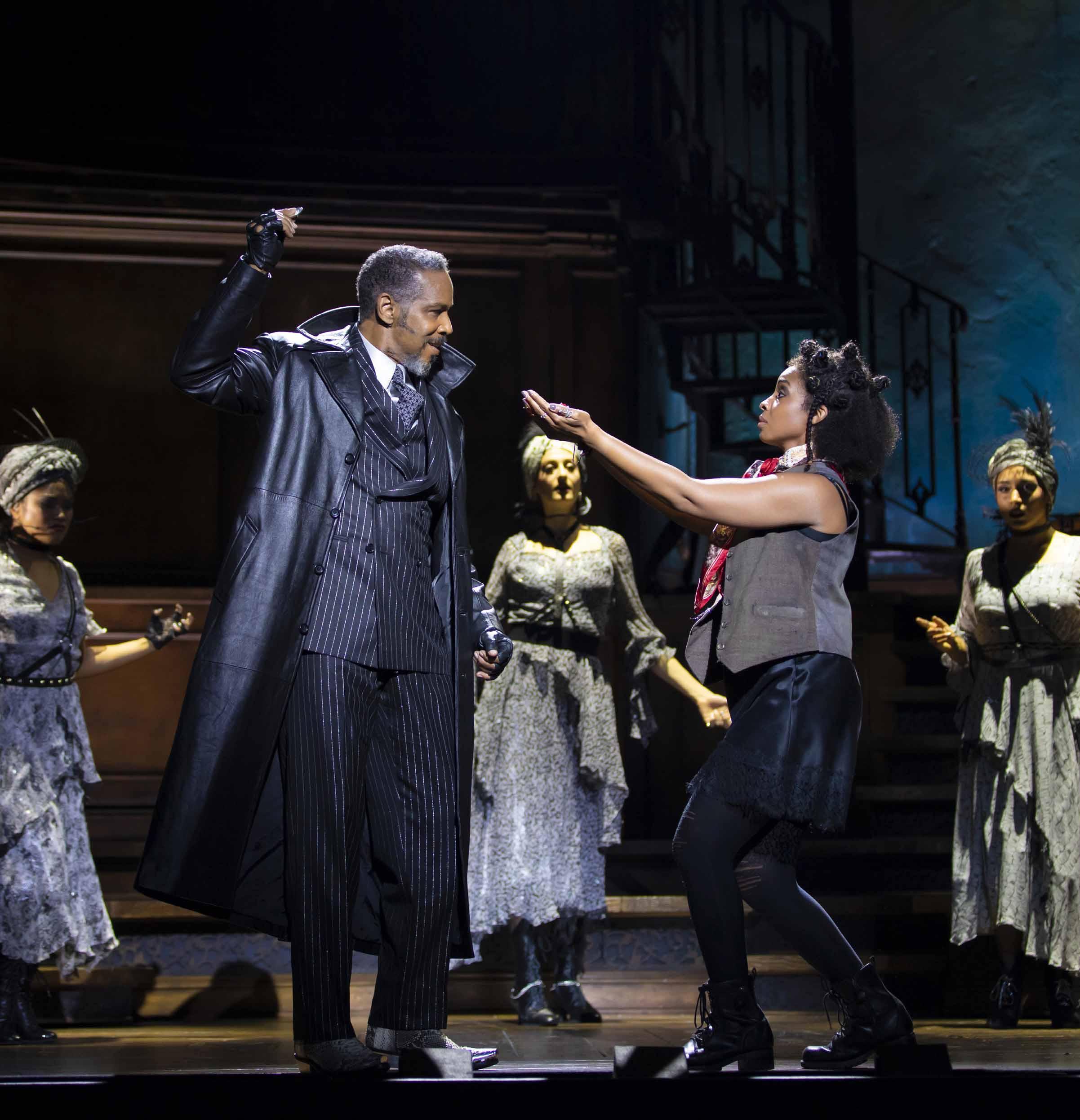




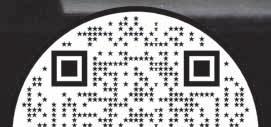

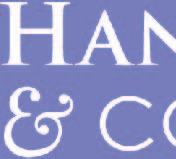


WORCESTER ART MUSEUM fifty-five salisbury street worcester, massachusetts
Save time when you arrive, reserve your admission tickets in advance. Visit worcesterart.org for COVID-related visiting updates.
Wednesday Sunday, 10am-4pm Open during the following holidays: Martin Luther King Jr. Day, Presidents Day, Patriots Day, and Indigenous Peoples’ Day
Members: Free Adults: $18
Seniors and Students: $14 Youth 0-17: Free EBT, WIC, ConnectorCare cardholders: Free First Sunday of each month: Free Free First Sundays are sponsored by Sandy Hubbard and Thomas J. Logan and Saint-Gobain
Open during Museum hours. For curbside pickup or mail delivery, call 508.793.4355 or email shopsales@worcesterart.org
LIBRARY 508.793.4382 library@worcesterart.org
The Museum library will reopen in 2023. For information, visit worcesterart.org/library.

Higgins Education Wing classes@worcesterart.org Registration: 508.793.4333
GROUP TOURS 508.793.4338 grouptours@worcesterart.org
MEMBERS , BENEFACTORS & ANNUAL FUND 508.793.4300 membership@worcesterart.org

SALISBURY GIVING SOCIETY 508.793.4325 KatySullivan@worcesterart.org
INSTITUTIONAL MEMBERS / ACCESS ADS 508.793.4324 HeatherWalker@worcesterart.org
GUEST SERVICES 508.793.4362 guestservices@worcesterart.org
All entrances provide barrier-free access. Wheelchairs and walkers are available for loan on a first-come, first-serve basis. Please request upon arrival.
General operating support is provided by the Mass Cultural Council, Patrick and Aimee Butler Family Foundation, Carl Lesnor Family Foundation, Paine Charitable Trust, Jeppson Memorial Fund, Greater Worcester Community Foundation, and J. Irving England and Jane L. England Charitable Trust.
Unless otherwise stated, all images © Worcester Art Museum, all rights reserved.